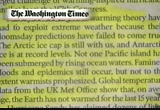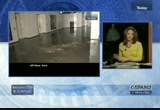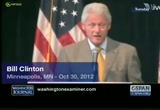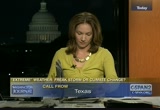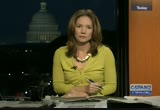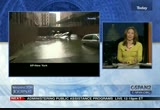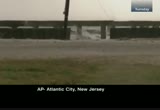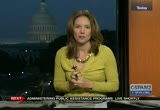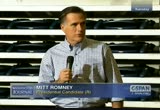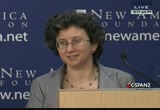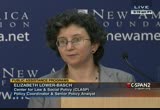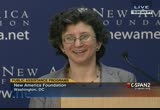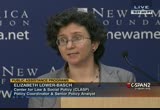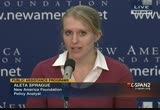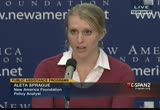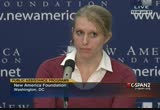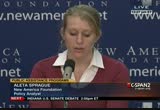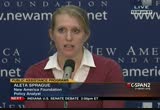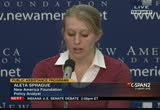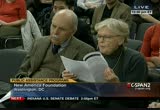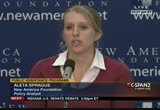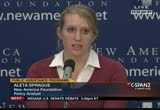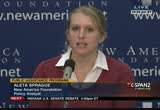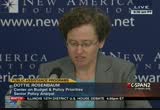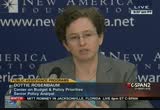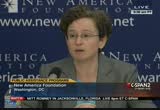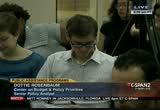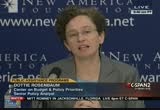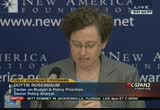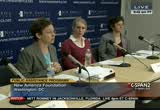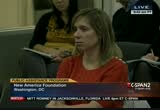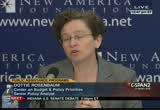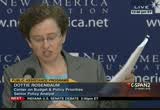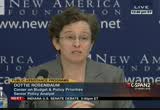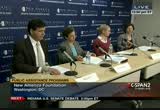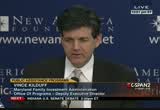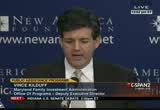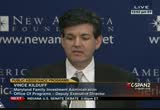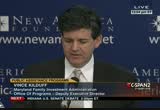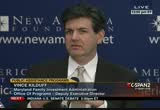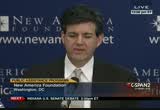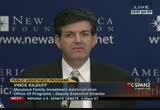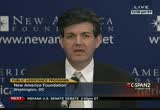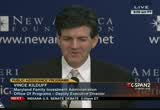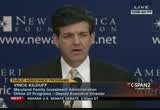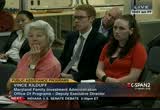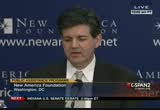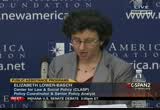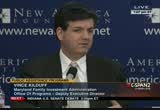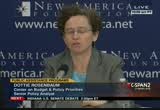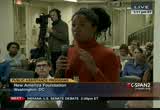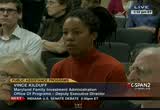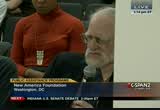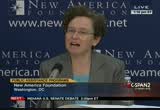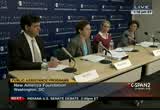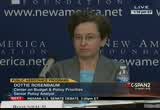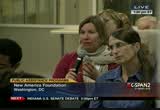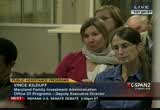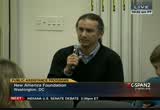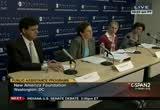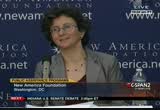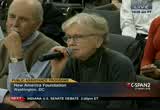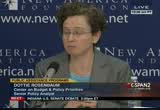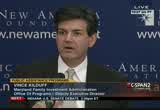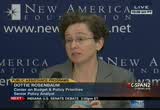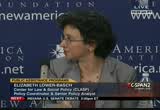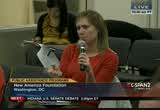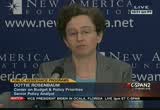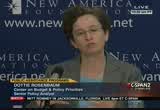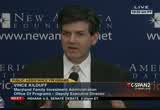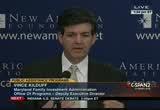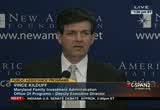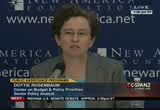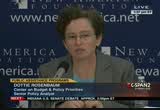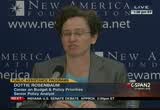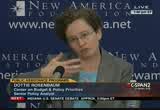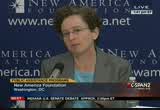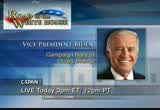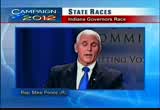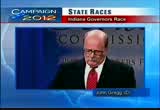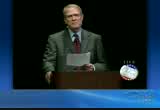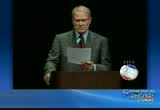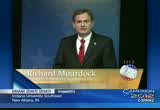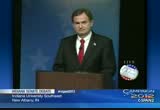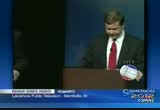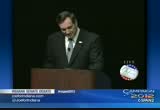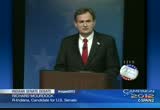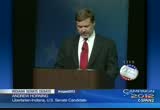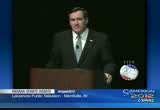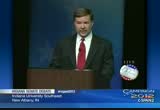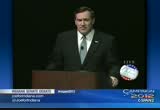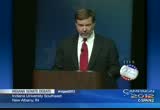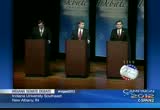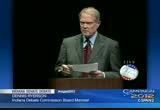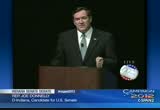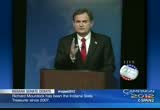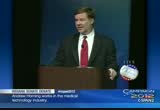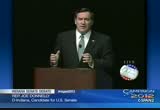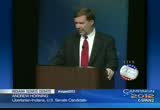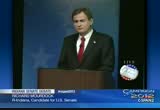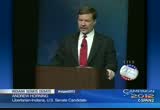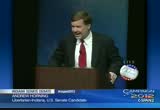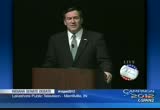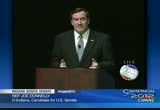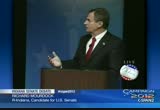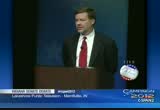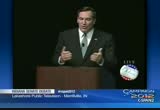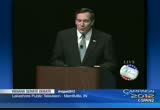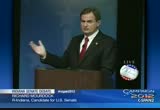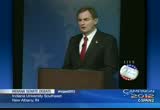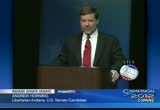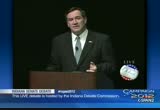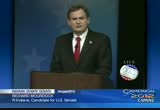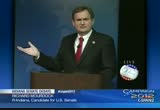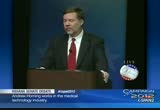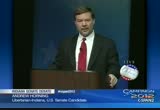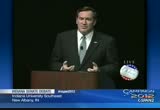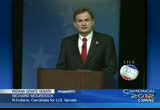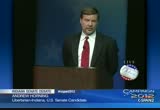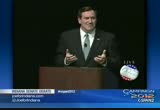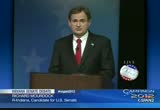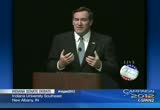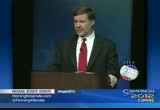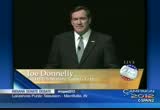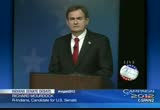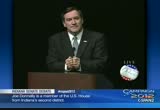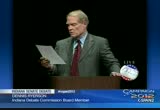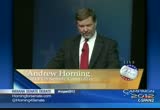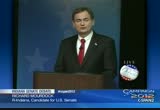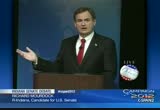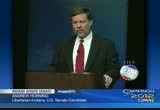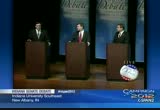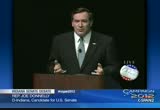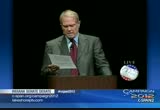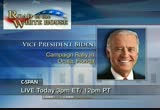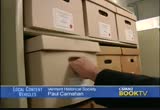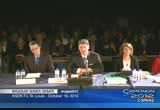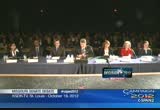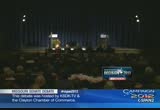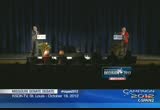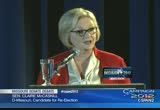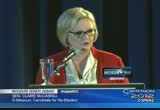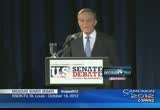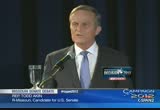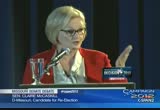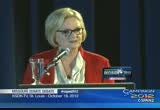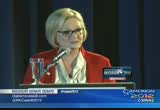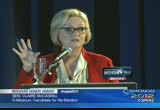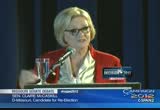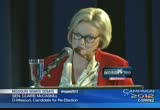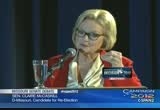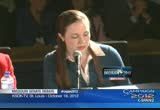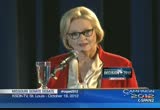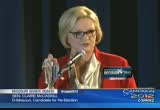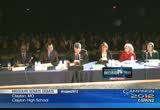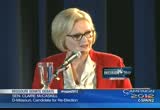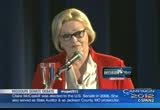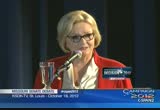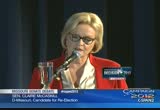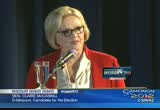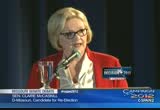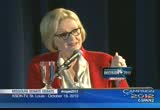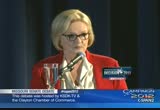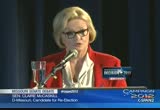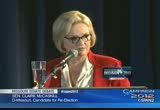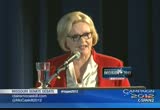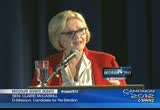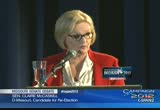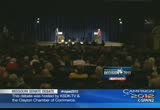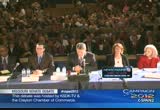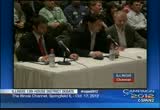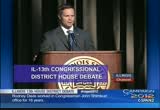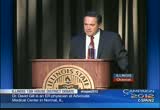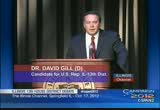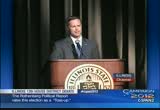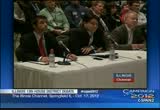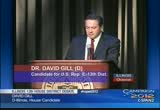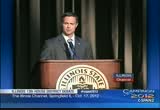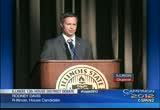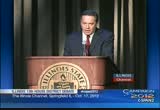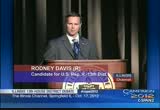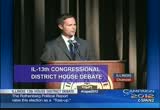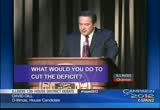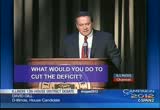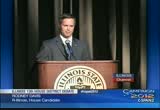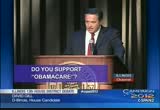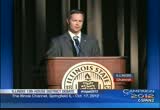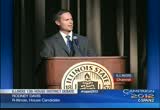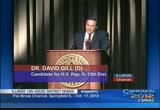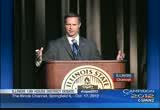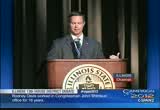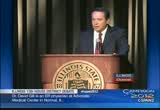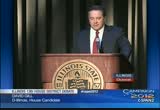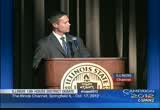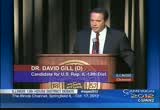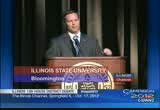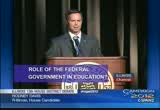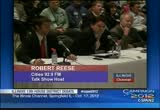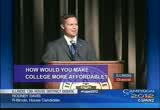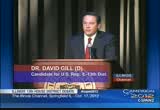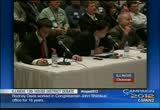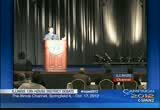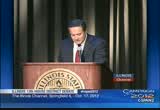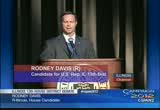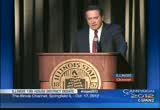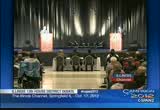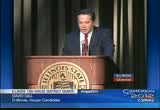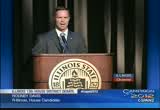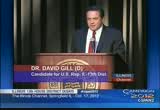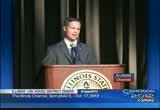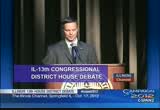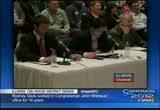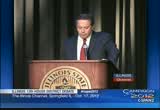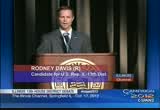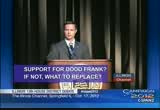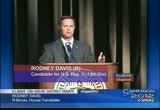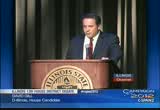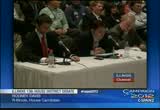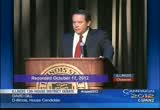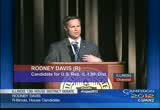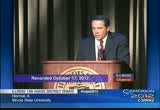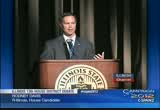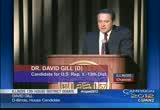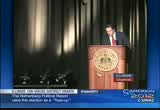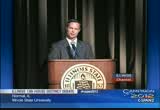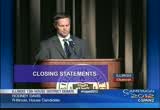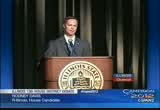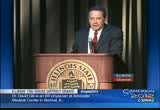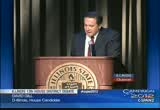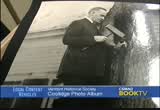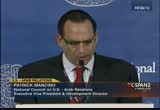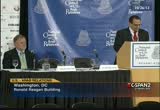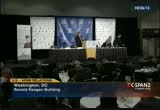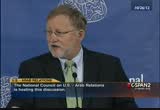tv U.S. Senate CSPAN October 31, 2012 12:00pm-5:00pm EDT
12:00 pm
you this morning. we turn to all of you fer outside of washington we want to get your take. actually we will stay in washington for the first phone calls. daniel kuran d.c.. democratic caller. go ahead, daniel. >> caller: thank you so much. the leadership in the country is acting with incredible shocking irresponsibility with co2 levels that are clearly affecting the climate and is also surprising that the democratic campaign hasn't pushed that romney is
12:01 pm
saying that he will improve the keystone pipeline on his first day in office. this is the dirtiest form of petroleum. its seemed to have a pipeline from alberta to texas. we are not getting this country off of our addiction to oil. it causes cancer and other diseases. we are given an election between two candidates that are both bragging they are going to continue exploring for oil offshore in the gulf and that is absolute treason against posterity. >> host: bill clinton and former president was in minnesota yesterday campaigning for the president. here's what he had to say on the store and climate change. >> was in closely to the candidate said in the debates. in the first debate, the triumph of the moderate mitt romney.
12:02 pm
you know what he did? he ridiculed the president. ridiculed the president for his effort to fight global warming in an economically beneficial way. he said you are going to turn back the sea. if we could have done that mr. de. all up and down the east coast there are mayors many of them republican who are being told you've got to move these houses back away from the ocean. you better call lifted them up. climate changes clinton lifted the levels on a permanent basis. if you want your home injured, you have to do this. in the real world, barack obama's policies worked better. >> host: former president bill clinton in minnesota yesterday talking about climate -- global
12:03 pm
climate change and mitt romney's policies on that. we will hear from governor romney who was in a high yesterday in a little bit. he took a campaign event and made it into an acknowledgment of the storm and the victims so we will show you a little of that later. james in texas, an independent. you are up next. >> caller: good morning. i am nearly 70-years-old and i've been around for a long time. i've seen winters that were colder than normal and lenders that were warmer than normal and over my lifetime i can remember here in texas i've seen icicles 4 feet long hanging from the rafters but then other times i've seen it where it barely got cold - year. so i think the earth has a cycle of warming and cooling cycles.
12:04 pm
one of the problems with sandy come hurricane sandy talking about the infrastructure being older and the worst subway damage in 100 years or some odd, one of the reasons it seems to me is we are paying so much in pensions to the union workers that we can't afford money for the infrastructure. >> host: that's the topic for "the new york times" front page, warnings that it could happen here. for nearly a decade they've told city and state officials in new york that it's a certain apparel rising sea levels and extreme weather patterns the alarm bells were louder after tropical storm last year when the city shut
12:05 pm
down its subway system and the water rushed into lower manhattan. tuesday as new yorkers woke up to submerged neighborhoods and electrical equipment they took their first step towards considering major infrastructure changes that could protect the fragile shores and 8 million residents from the disastrous damage. the governor said we will go next to new york i think, democratic call.
12:06 pm
help me with the name of your town. >> caller: what was the name of the question? >> host: the name of your town. where is that? >> guest: >> caller: about 45 minutes outside of new york city. >> host: did you feel the impact of the storm? >> caller: personally a little bit but a lot of places -- >> host: what are they being told when the power will be on? >> caller: two or three days which is unfortunate. >> host: what do you think comes four more planet change? >> caller: at first i was split but i'm leaning more towards climate change because here in new york we don't have a lot like down south and more frequently we've been having hurricanes, tornadoes and stuff like that, leading more towards climate change given that it isn't just a randomly -- it isn't random but it's an
12:07 pm
occurrence now. >> host: new jersey independent call. what do you think? >> caller: i think that al gore should take his inconvenient truth and grabbed an inconvenient shovel and to get down to west virginia and help them dig out from their inconvenient blizzard. >> host: referring to the former vice president's comment yesterday. he said this is due to global warming. >> caller: key and the rest. he said they bring on global warming and i think it's a fact of god. it's an act of god. maybe the answer to this -- i know the storm affected the liberal northeast and we should have more civil union gay marriages. >> host: here's the former vice president had to say. we must heed the warning and act quickly to solve the crisis. a dirty energy makes dirty
12:08 pm
whether they said on his block tuesday afternoon. james and memphis tennessee democratic call. good morning, james. >> caller: i think global warming start a trend throughout the united states and the world. now we have more floods, tsunami, more than ever before. what can it be accredited to other than being an act of god? it's the second time in less than a year that its flood of areas that have never been flood it was flooded 15 minutes from where i was at, national was flooded last year. it's getting to be a problem in
12:09 pm
places it hasn't been before. >> host: let's hear from mike in north carolina. what do you think? >> caller: i think it's whether. i think as the articles that you so articulately read stated from both sides of the political aisle there is no definitive conclusion that can be made based on the available data. it's all conjecture. whenever we have these things they are running around with their hair on fire trying to draw some conclusions because we use fossil fuels and this, that and the other but the storms or indirectly caused by them or whatever. when you read stated quite clearly no conclusion can be drawn from that. >> host: the ferocity of the storm the people say you can't tie the storm to global warming or climate change but the
12:10 pm
extreme is due to rising temperatures. >> caller: the extreme level is relative compared to what? i was watching a show just the other night and they predicted this would happen. again every time we have a storm this happens. if you go back to the 1950's, during the 1950's during a period of i think -- i don't know if it was six years there were at least half a dozen storms that came up the east coast said the sense of history and how extreme the storm was is limited to their personal experience with their knowledge of history itself. we've had storms before that have come up the east coast to the major storm hit new york, providence rhode island and that area i believe in 1932 will
12:11 pm
before we were able to forecast these things. i don't know. i am honest enough to say i simply don't know, and no one really does. but for every one that has this agenda against carbon energy, these people are just despicable because they don't know but they won't say they don't know and that is what is upsetting so that is personally my opinion. >> host: here is the blog for "the new york times" written by justin contributing to the devastation. he quotes dr. trend who's a scientist of the national center for atmospheric research in boulder colorado that global warming has been raising the overall temperature
12:12 pm
he says perhaps as much as 10%. other scientists are looking at the historic loss of ice in the arctic as a potential contributor to the track of sandy. you remember the "the washington times" that there hasn't been this loss of fais. its fallen by roughly half since the 70's and changed most climate scientists largely by human induced warming. again we are getting your take on this and we will go to john next in mexico. a democratic caller. go ahead, john. >> caller: hello. yeah. good morning, c-span. it's always a great honor to be on c-span. you quoted the ipcc report. i studied this in geology last year and wrote a report.
12:13 pm
those are the top scientists in the world. they use words like a mac with a plea, climate change is rarely used, words like absolutely the climate change has been used. 95-degree present uncertainty the planet has been changed. i drive a ford in the festival great mustangs and i'm driving a truck now, pickup truck, and i like driving, i like the freedom of driving and i want to be a hypocrite here because climate change is real and you can ignore it. it's not going to go away. you think and act of god it's not planned to change it. the top scientists in the world agree on that report the ocean level was rising, climate change is real. yes, ma'am. >> host: you were talking about you like driving. here's the "the washington times" editorial this is how we
12:14 pm
conclude global warming in spite of automobile regulations would claim hundreds of lives by making vehicles less safe. the environmental protection agency warns i don't know that there is enough money for the problems to solve it. this is why it is depressing to me personally it's very depressing because i really think that there is going to be a mentality to get the government spending any money at all because -- i would agree to this point if there is not enough money i think we could drive more efficient cars and we could change the power plants but if there isn't a profit of
12:15 pm
changing to natural gas, companies won't do it. they are not going to lose money to change their power plant over to natural gas. the afton de subsidize. i think it is a sad day because america needs to admit climate change is real and we don't have the money to fix it. i don't have the answer for you but it's ignorant to ignore it. >> host: that's john of the mexico. the presidential candidates were sidelined on the storm from campaigning six days ago before next tuesday's election and here is the headline on the "the washington times" romney balances sympathy and politics to raise donations here's what he had to say about the rally yesterday. i proceed affect people in dayton got up this morning, some went to the grocery store and purchased some things that these families will need, and i appreciate your generosity.
12:16 pm
it's part of the american spirit, the american way to give to people that are in a need in your generosity this morning touches my heart and i appreciate what you have done. we have a lot of good here and i know there is more coming in and we are going to box these up in just a minute and put them on some trucks and then send them into a i think it's new jersey as a site that we've identified that can take the goods and distribute them to people that need them. we won't be able to solve all of the problems this morning. a lot of people will still be looking for goods even though we've gathered these things as you know but i know that one of the things i've learned in life is you make the difference you can. >> host: extreme mother got freaks or more climate change is the question. here's the new york daily news hurricane ike sandy's win this land a 160 get water tanker to the shore where it runs aground on front street in stapleton
12:17 pm
rhode island i believe. this is a picture that was in the new york daily news this morning and then hear from "the new york post" this morning. >> see the washington journal life every morning on c-span starting at seven eastern. we will leave this year. live now to the american foundation for a discussion on the progress of public assistance programs at the new america foundation hosting this program looking at public assistance programs and opportunities for improvement. this is just getting started. >> first the new america foundation. thank you for having us. this event is also co-sponsored by the coalition for access and opportunity which is a coalition of groups that have come together to share and publicized best practices come identify senator opportunities and promote policy reforms to strengthen the safety net by removing barriers to
12:18 pm
persecution. our members are very diverse and include practitioners, researchers working together to improve access and to better coordinate the range of the federal income work support. the coalition has convened by class, by first focused dancing will stop usa and based in new york city and regretted they are unable to come down today to think of them as well. the goals of the coalition are to improve individual and family financial support to advance health and well-being, protect against the material for japan to promote opportunity to the middle class in a range of safety net programs that people are eligible for. we know these programs have made a huge difference in a recession as well as in better times but
12:19 pm
particularly in the recent years people would have been much worse situations of these programs hadn't been in place. no one wants to be on these programs. we all recognize the job that pays good wages is the long-term solution to poverty that when those are not available to people that have barriers that prevent them from working we are very grateful that these programs are out there and are available to give people the health care, the food and the income that they need to support themselves and their families. we also know our safety net programs can work better than they do. many people we don't get any benefits even though they are eligible or they get some but not all of the programs that they could get. others to get them but only after spending an enormous amount of time and effort to figuring out what they are
12:20 pm
eligible for and going to different offices to apply. part of it is to think about the way the states are moving to make this an easier process and ways that it could be even better in the future. we are at a very critical time for benefit access at the moment. there's still a great deal of needed due to the recession. and we've made some real improvements in the system over the past decade. snap or food stamps which we are going to hear more about soon has become much more accessible over the past decade due to a combination of federal and state reforms. under the children's health insurance program express lane eligibility has really put us on a lot of the red tape and the rules that have made it hard for people to access public benefits in the past and that's one of the reasons we see the children's rate of one insurance
12:21 pm
declining even as we know if your people have access to employer provided insurance. programs like school lunch have direct certifications that set aside the paperwork. this has been a combination of policy choices again at the state, federal and local levels but also information technology improvements that have made things possible that were not available in the past. but a lot of these programs are under pressure now. some of it is so explicit political attacks aimed at outreach programs and aimed at the policies that have made it easier for people and on the programs. we also know the state agencies are stretched very thin. there are a lot of demands on them and their funding has been caught and in some we're hearing stories of unemployment insurance and people calling and calling to apply for their benefits and just getting a busy signal over and over again.
12:22 pm
it is a real opportunity to think about how we can build on the progress we've made so far. how can we prevent it from wearing away and what improvements can we make in the future. in particular, the affordable care act or the health care reform presents an opportunity to make some improvements as we move forward. i am going to wave to reports also available outside of the coalition. one is specifically how the human service programs and their clients can benefit from health care reform and the funding opportunities that are available and the opportunities that the states have to rebuild their eligibility infrastructure. the other is a forward-looking vision of what a 21st century public benefit system would look like. with that introduction i'm going to turn to the panelists i will
12:23 pm
turn first to aleta sprague of the american foundation to talk about asset limits and their new work. >> thank you. i would reiterate what was said and thank you for coming despite the weather. it's great to see so many people in the room and know so many are watching on line and that is a testament to how important this issue is at this particular moment. what i am going to be talking about as elizabeth mengin is a very specific aspect of this larger red tape issue that we've identified with asset limits and public assistance programs. this is probably not new information to a lot of people in the room but for the sake of context as the limits are cap on the amount of savings and resources and applicant or participant in a public benefits program can maintain and remain eligible for benefits. the test widely across the state and programs for actual dollar
12:24 pm
value of the total asset holdings and the specific resources would count towards that limit. for example, in the temporary assistance for needy families it is a pretty casual affair from six states eliminated the tests entirely while others range from $1,000 to the high of $15,000. bye contrast this with snap formerly known as food stamps they do not have an asset for the vast majority of applicants. to prove resources and pass the test essentially applicants must bring a burdensome amount of paperwork and information to their eligibility interviews ranging from bank statement car titles to even funeral agreements. this is a time-consuming process and the paperwork has been
12:25 pm
founded as some people from accessing the benefit they both need and qualify for. one of the most obvious effects of asset limits is they prevent the accumulation of the assets whether an emergency like damaging hurricanes, for example. the asset line is the level of savings a family would need to survive the poverty level for three months in the absence of income. that's currently $4,632 for a family of three. that's higher than the test for snap and 41 states so the policies contel families to remain on asset poverty to receive any assistance. for this research we chose the programs. this is a question with important implications for participants and state and local agencies particularly in light of the recent state budget cuts and reduced staff.
12:26 pm
furthermore in the past two years the states that have previously eliminated their tests pennsylvania and michigan have chosen to bring them back. additionally there been proposals on the recent bill to eliminate broadbased eligibility which is the mechanism which the states have been able to increase or eliminate their asset tests. to gather this information about the effect on the administration and the programs we sent a survey to the state administrators to a wide array that have made policy choices with respect to their asset test and tanf and snap and conduct follow-up interviews with administrators as well as advocacy organizations particularly in the states where the organizations played an instrumental role in bringing about policy change. with that introduction, i'm just going to go through some of the key findings and some lessons we learned from administrators that could be helpful in the distance that may be considering changes in the future.
12:27 pm
first for every state we spoke to that collected the data we heard a very few applicants either snap or tanf had assets to speak of, they were rarely approached the limit was reduced to be. for example in alabama the year before the tanf only 15 out of over 21,000 denials and 15 of 0,420,000 foreclosures were due to excess assets. this may be one of the more extreme examples that we heard what we heard similar figures and anecdotal data from almost all of the state's we spoke with. i think what we can learn from this information is that evaluating the assets is in the most efficient way for the eligibility workers to be spending their time since very few applicants would be disqualified based on these assessments. so, another thing we heard that sort of plays off of this is that he eliminating asset tests
12:28 pm
broadly increased simplicity and a streamlined eligibility determination. the process of verifying assets is full of rules and exceptions and is generally a complex evaluation requires significant documentation. in most of the reports increase in paucity were more on the anecdotal side than based on the salles led the the figures and that is because many states eliminated the asset tests in tandem with other simplifications such as simplified reporting and that is what is difficult for them to isolate the effect on the asset test. still i will touch again on this momentarily some states were able to offer cost estimates of eliminating the test prior to implementing the change. for example in virginia prior to eliminating its asset test the state estimated it spent an additional $127,000 on benefits for 40 additional families. this would be offset by about $323,000 in savings in the
12:29 pm
administrative costs. another issue we that that was the overlap in the case loads on the programs with different tests in place to do and not 8 percent of a child's households receive and tanf also receive snapped. there was significant and very handsome the figures. in california for example a full 20% of the snap households also received tanf. that means the snap has been eliminated in california, 28% of recipients would still be subject to the $2,000 tanf test. overall this speaks of the problem how the income rules and programs try to get families in similar means can both perpetuate confusion about eligibility and limit the ability of the reform that occurs in one program and isolation to reduce the red tape and burdensome paperwork requirements. this also assesses their needs
12:30 pm
to be a regulation that a family may qualify for and be subject to different rules that for example snap and medicaid and well-intentioned ruled that simplifies the eligibility in one program to diminish practical cats and the similar requirements remain and others. on a related note some describe issues with implementation of the acid test reforms that mitigated their effectiveness. for example in louisiana we heard about the case workers asking applicants even if they shouldn't be subject to the test it in part because there was an adequate training on some of the workers following the policy change. similarly many states reported that the applications had not been updated to reflect changes to their policy. at least 22 states have combined application still asked applicants for the information even if they are only applying for snap and they've gotten rid of the asset test. i should note that in general
12:31 pm
12:32 pm
they forecasted they would have shorter application processing times. for example, in colorado, just the most recent state to eliminate tanf off the justice department him serves as the eliminating tanf off the test would probably cut back on about 15 minutes per case interaction, and, therefore, up to 20 minutes during the first 45 days of a new case when they anticipated every five to six case interactions with a new client. other states are limited their acid test improve their payment accuracy. ohio in particular a limited its snap asset test when it was facing $3 million in sanctions from the usda food and nutrition service because of its high error rate in snap. the state hired an outside consultant. they could think of ways it could lower and one of the ideas they came up with was implemented eligibility and the asset test the clock and
12:33 pm
mentioned before, determining asset eligibility and making these evaluations is complex. it's because the rules and exceptions are often unpredictable and arbitrary in a lot of cases. it's an error-prone assessment. and since ohio did a limit its test it finds the error rate has declined significantly. lastly, several states noted that their motivation for a limiting acid test because the rectum is the hinge been having this this as a limited place and the mission of the program that they were administering. specifically in louisiana the tape just eliminate the tanf testify because they reckon it's a conflict with initiatives that had a place to savings and retirement for tanf recipients. in colorado administrators also noted having their tanf asset test kit -- capped families instead of one of the uncredited very to long-term
12:34 pm
self-sufficiency which could actually increase the time spent on benefits. there was a lot of information, contends in a short period of time. there's much more where that came from in the paper that we're just releasing today, and you can find some copies on the table outside. and we're also going to be producing a data site to put some of this information into more visually accessible form over the next few weeks. but just to conclude i would say the over arching lesson of this research was that eliminating asset past not only cuts are tape for applicants but also eases the burden and potential the cost of administering these programs. thank you. >> thank you so much. our next speaker is dottie rosenbaum of the center on budget and policy priorities, and she's an expert on the snap program or food stands and has also been working on a project funded by the foreign foundation to help states think about cross
12:35 pm
program issues and using administration. >> so yes, i was asked to talk about snape access and going to talk about the summit also talk about the cross program issues, particularly in light of health care reform. so thank you very much for inviting me to be here under happy to be here. so, nobody here is that snap access is very good. i think that we've seen in the last few years during the recession that the structure of the snapped program, when i think the access i guess i should start by saying i think about both eligibility, who is eligible for the program and doesn't serve the people who it is intended to reach. and then how hard is it for people to access the benefits, what is the red tape involved and so forth. so i think on those fronts actually, the program is very strong. the structure of the program allows for when more people need help, they can purchase abate if
12:36 pm
they choose to apply. currently there's about 46 and a half million people who, which as we've heard from a lot of different sources lately is a big increased during the recession. and this means that both in terms of program rules and in terms of administrative access the programs able to expand to meet the need. and then will contract when the needed declines. the growth that we've seen in snap has been in every state. some states more than others but every state has grown. and over the last couple of years as the economy has started to rebound a little bit, very slowly, especially with long-term unemployment remaining very high, we've also seen the growth in snap begin to level off. so come and then again this week of course i think it's important to think about the ability of the programs that respond not just economic conditions but also to disasters. there's a feature the the program that enables snap to be one of the first programs that is on the ground offering help
12:37 pm
to people and grocery stores doctor reopen, and very temporary help of only a month or two. so that's really important. participation rates among those who are eligible are very high. the most recent estimates for 2009 but we have no reason to think it come down since then, and in 2000 the department of agriculture found 72% of all individuals who are eligible participated in snap. almost 90% of the benefits for which people qualified were actually paid to these eligible people, or provided helpful people on their ebt card, meaning that the people are most likely to participate among those are eligible are the people who qualify for the highest benefit. some of the gaps in the participation rate among people who qualify for lower benefits, notably senior citizens have lower than average participation rates, working families historically have, as have eligible citizens that live in
12:38 pm
households with in eligible noncitizens. and actually for working households we are seeing some improvement in recent years. both 2000 participation rate for working families stood at 60% which is an all time high nationally year and, of course, like everything else in snap its participation rates very feisty. we have some states where the rate is close to 100%, and that is what is barely above 50%. that's the minority. the ones that are 50% but there are some where their struggles. so that's the overall picture. i've talked with you about access to snap, in particular, and then i'm going to switch and talk to what i think is the most important snap access issue currently which is about thinking about the package of benefits that people qualify for. so within snap, access is certain a changing. in part because of the greater use of technology as a smidgen, as elizabeth mentioned, in response to higher caseloads.
12:39 pm
sorted out of necessity. and also because of the direction that the health community has been moving in for a number of years in terms of most with children's coverage up until now but now under health care reform it is envisioned sort of for all health coverage, which is a simpler, more streamlined, more automated system under the affordable care act. so the old vision for access to snap was that you went into the local human services office and he sat down with a case worker, and you had a 45 and/or an hour-long interview, and then you've come utah while you are eligible or not. this expectation that people will make frequent trips to the human services office in order to apply for snap and then over time to keep snap is changing across the country. there's no 37 states that the online applications at about half the states offer other online services. there's much, much greater use of telephone, for both
12:40 pm
interviews and for inquiries. many states have set up call centers like what you experience when you try to talk your health insurance, or you know, anything these days. car-rental, whatever. a growing number of states are looking at the same dave service instead worst dates -- same-day service, or with the family, and cover all that's necessary to issue benefits, either that day or within 24 hours. and then also have less paperwork over time for people to retain benefits. and this is done by greater use of automated data sources, collateral contacts and reduced verification requirements wherever possible, while at the same time maintaining very, very high program integrity. the snapped a rate which is one of the most rigorous of all public benefit programs is also at historic lows right now, meaning that we know because of the with the program goes in and
12:41 pm
looks at, and samples cases, that almost everybody, 98% of people who receive snap benefits are eligible. so the cost of participating has been reduced for many. the people of access to these kinds of technology and the ability to use the for the ability to get help using them. others may face new barriers. i was recently at a local office in a southern state where i was sitting in on an interview and seeing their fancy new automated system, and i sat in on an interview with the woman who was a part-time hairdresser, self-employed, what come in with a blank certification form and the workers at and help her fill it out. she said i always do this. i was coming because i'm afraid i'm going to make a mistake. and i know if i sit here and she walks through it with me that we will get it right together. so that kind of individualized attention may be harder to get now in the environment that states are moving to. states really there in the degree to which the shift to automated method is being pushed
12:42 pm
versus just being offered as an additional opportunity for accessing the program. and so i think it's important to remember that not all low income population of access to the technology, to the internet or the same ability to be able to use it. we hear about prepaid cell phone plans being a problem for people when have to wait on hold for a long time or participate in an interview over the telephone. many states are closing local offices, which would mean that people live in remote areas have to drive farther if they do want to be able to see somebody and talk to things within. and are increased, or still have reports of uncommon benefits, lost paperwork, long wait times in person and on the telephone. and auto closure, which is sort of the way fancy way of saying that the state had the cheerios for people but didn't have the time to act on it so the computer automatically will close cases. and that can lead to what is called churning sometimes, where
12:43 pm
we are seeing certainly increased attention to this phenomenon where people who are eligible have the case is closed for whatever reason, and usually and administrative barrier of some kind, and then turn around and reapply understandably because they still qualify for benefits. in some places 50 to 75% of new applications are coming from people who recently were on the program but this sort of fell through the cracks because the system may be difficult to navigate. so these types of access problems i visit make disproportionately affect some of the neediest families. and what i think about that 90% participation rate i think about the fact that the programs in terms of benefits getting out the door, and decorative program is were successful in ending a professor of the neediest families. so when we move towards these mistakes and local committees move towards these new type of approach as they hold a lot of promises for many people, and we need to think about the risks
12:44 pm
they may post to other people. and lastly under current law before turn to part about health reform, i just would be remiss if i didn't point out in terms of access that there are some eligibility gaps in the snap. now be for some legal immigrants and unemployed childless adults who face a three-month time in a three month time limit has been suspended in most parts of the country during the recession. but basically if you don't have shown and you're between 18-29 you can only get food stamps, snap for three months. over a three-year period. if you're not working. and so that time limit will be coming back in the coming years and is really a serious weakness in the program. and we can talk, if people want to comment about what some of the other changes that are legislative the under consideration in coming, in congress right now. if folks want to go there but i'm going to skip that. most of what i want to talk
12:45 pm
about, looking forward to the next few years, what is the future of the snap access, and we were think as i said, about packaging step with other public benefit programs and safety net programs for low-income population. we can just dartmouth snap and medicaid because of the two programs that have the broadest reach, and because of the opportunities that are coming health care reform, where as was mentioned for very, very big improvements to eligibility systems and other changes. but other benefits are also important such as childcare, education and employment services, cash assistance, energy assistance. and others, housing and others, wic, school meals can also be included in the package. the technology that is available, the cloud, the enterprise architecture, the rules engine can unlearning all these terms, it makes it possible. it really expands the degree to which information can be shared and things can be streamlined.
12:46 pm
but the policies and procedures and how human beings interact with those systems behind the scenes and in front of the scenes, it's also very important. i do think there is a one size fits all kind of approach. the states along with local communities and the federal government with input from others need to figure out how a coherent vision to be made to package all these benefits together. right now in most states people who applied to the human services door are able to access health benefits. especially lowest income families. but there's a risk i think under health care reform that as states, states may split sort of the health, health peace off as they aim to integrate the health program across the different health coverage option. there is this risk by the lowest income people will face new barriers in accessing a package. so there are ways to set things
12:47 pm
up for the human services programs get to take advantage of all the positive changes that are being made in the health area. and i should say, these positive changes are independent of whether states choose to take the expansion of medicaid. most all of these, all of these changes are going to be happening even in states in terms of being able to line up with a federal exchange and been able to use new technologies, are going to be happening even if states don't take advantage of the medicaid expansion. and the administration was also mentioned has made important resources available for states to be able to include human services programs in the new vision. some states are taking the lead on thinking this through. for example, as elizabeth mentioned we are working to project founded by the ford foundation and with the urban institute as the lead where six states are really undergoing major revisions and redesigned for their work support system.
12:48 pm
primarily snap, medicaid and childcare with an eye towards integrated approaches. and i don't have time to go through all of -- let me just say, i don't have time to get to all of the things that i want to point out two papers that are on a website. one is called improving -- i didn't bring copies but this one is more lays out the vision and goes through some of the innovative policies and practices that are under way. and this one is a toolkit called coordinating human services programs with health care reform implementation. is intended for state agencies and goes through a lot of questions that states they want to ask about how they're setting things up, and with the different opportunities are, provides tools and so forth for thinking through how they might want to answer some of those questions. but in the short term i think it's really important for, there are major opportunities for states to be able to use snap information to automatically enroll people in medicaid. come a year from now if states
12:49 pm
are looking at rolling out health care reform as of january 1, 2014, they will be starting to other systems up and running in october. virtually all snap recipients in the state that takes the expansion will be eligible for health care through medicaid come into taking advantage of the recent information that's available without having to make people applied through a new system will both make the transition seamless for the recipients, and also lop off a whole bunch of people that states will have to be separate, new eligibility determination. sub want to close by saying i think it's important to think through the spectrum of different customers that are served in the various programs that people talk about when they talk about the safety net or the work support system. and think about how we can have a system in place that meets the needs of the full spectrum of people who interact with the system. some people would just need work support benefits. and so giving in this bbc,
12:50 pm
lowest most i could access to benefit is very important. others have a more complicated range of issues and challenges for the adults and children and those families to be able to succeed. and so it's important to think through how did that richer set of benefits become available to them also in the least burdensome way possible. thanks. >> thank you so much, david. so, as we've heard all of these policies are implemented through the states and by the states, and there's a great deal of variation across as we didn't think it was important to have a state perspective on this panel. our final speaker is vince kilduff was the deputy executive director for the family investment agency, administration, sorry. to the state of maryland. and thank you very much for joining us. >> thank you, elizabeth. maryland is among the states
12:51 pm
that embrace many of the current strategies for increasing participation in its safety net programs and cutting red tape. we adopted online applications. we're conducting data matching come civil the eligibility rules. we've also expand our outreach campaigns in recent years, and looking ahead but not too far ahead we're designing our state health insurance exchange to accommodate, to service a portal for other assistance programs. in terms of making those kinds of things happen, i consider our agency to be fortunate to have both the governors and legislatures support for expanded program access and reducing barriers to eligibility. it leads us to possibly to apply a broad strategy to employee expand program access without the worry of political considerations. so one could almost say though,
12:52 pm
the sport is so good it's almost as if it is mandated. for instance, governor o'malley supports the president's goal of ending child hunger by 2015 as a result of the governors partnership to end childhood hunger, maryland's food supplement program which is our name for snap, added 61% more households with minor children to the program between december 2008-september 2012. the partnership includes state agencies that offer other operate under safety programs as well as community-based organizations. so that's a great partnership. and become his staff holds hungry staff meetings to review the agency's performance, and holds us accountable. the maryland general assembly also has been active and it authorized a new wrongdoer workgroup in 2010.
12:53 pm
the group was co-chaired by the state snap director, and by an executive from one of the local cbo's. the primary goal was reducing barriers to access at every point in the service delivery system. the final report came out in 2011 and listed a number of short-term and long-term goals. the very influential group can now be touching on many other goals because a lot of them were implemented. a lesson from that, that experience in my opinion is a legislative bodies can be effective at bringing agencies and community groups to the table. earlier i mentioned the service delivery system, and one of the elements, one line applications. to the extent to which those are used, so it's not as if they are a new strategy for strengthening the safety net and reducing barriers to participation. as dottie noted, many state and
12:54 pm
local governments are in the early stages of adjusting to the effects of that model on their local offices. the key difference being both case managers and applicants don't have that face-to-face contact. the online application at a phone interview model, it also changes other communications. we had, for instance, the video clips running in waiting rooms. it's just that region as large an audience as it did in the past. but there are some strategies state and local governments can employ when adjusting to these new models. one is a real very straightforward as the messages we use to have an, or allowed in love in our local offices. those need to be out on the web in a format that can be accessible, either mobile or buy a desktop. and i think online application questions need to be reviewed
12:55 pm
carefully. both on the customer facing side and as they come back through the case manager or the agency side, on the backend. i think is the risk of not catching all the customers needs, you know, if the application forms so to speak don't have enough blanks i guess to fill in. my concern is we may lose some of that communication process in our efforts to make these online applications clear and simple and short. there's a risk there. and second is, make sure that when we capture those, when we do it right and capture all those that they're committed to the staff at the backend. i do want to get too far into the weeds, but many states use legacy mainframe eligibility systems, some from the 1980s, and it's important that there is interfaces from the more
12:56 pm
flexible new ends of the system make it back to sort of the green screen part of its of case managers have the information to work with. training, again to reiterate that, in conducting those interviews effectively without the face-to-face contact in order to pick up what's beyond the needs. maryland is in the process of changing its new worker training model to a scenario-based sort of general, more general customer model. formally we use a module-based one we did a week of systems training, where it was a module for training, a module for snap policy, another one for medicaid policy. and very excited about the change that we are putting forward. and we've been using online refresher training for veteran staffer more than a year now. using information from the evaluation data to inform us of
12:57 pm
what kind of question, what kind of policies need clarification on what areas allows us to tailor the training. it also, we are not pulling people off the line for long periods of time. essentially online, we don't like to use the word but it is what it is. and it has some questions and it's a great feedback loop as well. you can make sure that folks get it. states using call centers should also receive -- should also decimated in training on that because these aren't long contacts but it's a contact and we should take advantage of it. last point, a lack of the physical point of entry is not a bad thing. in maryland we had, i think we're up to about 75 registered partners who file applications online through our sale portal.
12:58 pm
and i think the numbers large because one line option lowers the cost of providing assistance to the public. they can reach far more people than it sort of the old model we had to do home visits are actually tried people to offices. so that's definitely a plus. now going to transition from meeting the unmet needs of customers who found us to the agencies of finding people who may have unmet needs and are not with us. data matching is an effective strategy we've adopted for that purpose. two ways to do this. gis mapping low-income populations or other demographic data versus your active caseloads. you can also match databases of your active caseloads for various programs against each other and find those who are just venting some but not the others. and outreach partner in maryland has been mining the federal
12:59 pm
heating assistance list to find households that have received energy assistance but are not participating in snap. that makes a lot of sense because the income guidelines in our state are very similar. the partner first use this in a project to target households but now they're using starting a new project to reach families with minor children. another way to reduce red tape, obviously is to simplify the eligibility rule that created it in the first place. in my opinion this is one of best outreach strategies available. both parties in the transaction benefit. there's lower verification, other burdens on the customer's side. ..
1:00 pm
>> enough to close their cases or have them denied, and it just wasn't cost effective. we've adopted another program, a six-question check at the midpoint for a snap certification to reduce the burden, again, on both sides of the transaction. formal outreach is another area where we've been active, um, in strengthening the safety net. our partnerships with community-based organizations for snap outreach has grown in each of the past three years. i believe we have 14 agreements in place this year. it's also a great way for local cbos to leverage their resources. this program, essentially, doubles their money.
1:01 pm
we have also found an unintended benefit, back to some of sort of the things we've been hitting today. these partners are working very closely with customers and very deeply in the application process, and they're serving as eyes and ears in our local offices especially for large states with really far-flung operations. they may be picking up on some sort of red tape issues, other things the state's evaluation management may not pick up. in our state when we get, we get that kind of feedback during our meetings, we're able to go out there and address it right away. i've been involved in the development of maryland's health insurance exchange. i'm pleased that the plan to operate that system as a portal for other assistance programs in maryland. it's going to replace our agency's online application in 2014. and as far as i can recall, the
1:02 pm
push to coordinate those safety net programs with the health care reform was back at that round door work group. more specifically on how we coordinate these programs, it's -- the process there'll be points where the applicant can opt in to other assistance programs. there's an opportunity fairly early in the medal assistance application -- medical assistance application process where they can choose some of those other programs, and then there's also one at the end. it's sort of like we're asking are you sure you don't need this kind of help, and i think that's a great feature. so in closing, those are some of the ways, some of the things that we've been doing and some of the ways other government agencies can expand access to the programs and strengthen the safety net. thank you. >> okay. well, thank you very much, and to all of our panelists. i'm going to kick off with some questions, take the moderator's privilege, but there will also
1:03 pm
be an opportunity to get questions from the audience, so do be thinking about what you'll like to ask. i want to -- a lot of these improvements have been, as you said, sort of behind the scenes, i think, you know, without a lot of legislative attention about some states positive, but, and, you know, i think now perhaps they're getting a little more attention, and it's not always in positive ways. i guess i was wondering if all of you can talk maybe to some of the pressures that are happening now to either bring asset limits down or not, you know, criticizing outreach spending and how you would respond to them. >> sure. i can get started on that. i will say that one thing i heard from, one example that came up from almost every state administrator who i spoke to about the issue of reduceing or
1:04 pm
eliminating some of the asset tests was the lottery winner issue which i imagine a lot of people in this room have also heard about. if there were two lottery winners in michigan, because there was no asset test in their state for continuing to receive snap benefits, and this issue was widely covered in the media. consequently, there was a significant additional pressure on snap administrators to maintain program integrity and avoid having a situation like that occur in their own state. so i definitely heard from administrators that that was something that they were very conscientious of and really, really feeling as they move forward with potential policy reforms. thatting being said, as far as actually implementing the asset test, we heard there were two
1:05 pm
ways of going about it depending on the state, either going through the legislature which is often more sort of a public process that got more attention or sort of doing this quieter way, by amending the administrative code. and i think one of the issues that comes up there is if we're talking about eliminating red tape and actually reaching more people who may be eligible, letting them know that there'll be less of a burden when they come in to apply for benefits, it's kind of a trade-off when you're saying, well, we're going to keep this change quiet. on the one hand, you may keep it quiet and then, you know, there's less of a public outcry when people find out that you can qualify for benefits while still having money in your bank account. at the same time, the newly-eligible people that you may want to reach or the people who have previously been deterred from applying for benefits because they know they have to supply all these documents, and they might not have them readily accessible, that could be what you're sacrificing. um, so i think there are a lot of considerations there about
1:06 pm
what your ultimate goals are for implementing a policy change like that. i think we've identified that it tends to benefit both the agency and the participants, but sort of weighing who you're targeting with the policy changes is going to affect that assessment. >> some of the legislation we see every year, um, affecting access you see lawful presence bills which is, adds the burden on both sides. most of these are going to add burdens on both sides of the equation. lawful presence, drug testing, reinstituting assets. and in a lot of cases the physical node will sink the bill, especially these times of tight state budgets. so that's -- on one hand there's pressure coming, but on the other hand the budget
1:07 pm
situation's actually pushing back. >> just to make sure everyone -- when you said the fiscal note, that means that when the legislative analysis office comes back, they say it would cost more money to implement this policy than it would save. >> correct, yes. thanks. >> um, well, i mean, snap is a little bit caught in the cross hairs right now. there is a farm bill that's been being worked on for about a year. it has a lot of really good oversight provisions in it. it also has some pretty deep cuts that would eliminate eligibility for about two to three million snap recipients by eliminating this option that's been -- primarily by eliminating this option that's been mentioned. i think there's some misunderstanding about what that option is. some have portrayed it as a automatic eligibility sort of thing, a major expansion that has contributed a lot to caseload growth when, in fact,
1:08 pm
it, you know, many people have said -- including the congressional budget office and others -- that the major reason for program growth is the recession and increased hardship and that that is expected to turn around by the end of, you know, within the budget period that's under consideration. um, the program will be back to where it was prior to the recession as a share of gdp which is sort of the measure for whether program spending is contributing to long-term budget pressures. um, but nonetheless, this two million person, two to three million person cut would affect predominantly working families, families with children, senior citizens, would roll back the asset test which, of course, hurts people who are recently unemployed and people who are trying to sort of put their lives back together and save for their futures. and also would roll back benefits to people who are just barely above the program's gross
1:09 pm
income limit but have expenses that make them be able to qualify for a benefit because they have high shelter expenses or childcare expenses. it's not the case that people are standing out on street corners handing out edt cards to everybody. in fact, everybody who qualifies under expanded categorical eligibility goes through the same application process. they have to provide all the same verification documents, have an interview to document their circumstances and so forth. it's just that at the end of that process if answer would be otherwise, no, you're not eligible because your gross income is modestly over the limit, but you can qualify for a benefit under the formula, the eligibility worker is able to get those benefits. um, so and then in terms of access, the access kinds of issues we've been talking about have not been a big part of the debate in washington, um, i
1:10 pm
think partly because of the budgetary pressures as was mentioned and because health care reform is a bit controversial, so people aren't necessary he right now -- necessarily right now talking about that, but one may expect that in coming months there will be more attention paid to that. but most othehings i was talking about are things that -- almost all of the things i was talking about are things that don't require any kind of changes in federal law. there is already a great deal of flexibility for states to be able to package benefits, reduce access barriers, um, and that the hard work is to happen at the state level, at the county level and then in coordination and collaboration among federal agencies, um, and state agencies across the different program areas. in figuring out the path that works, um, for being able to package these benefits. >> do we have audience
1:11 pm
questions? i think we have a microphone. >> okay. i have a question for mr. kilduff. you had mentioned that one of the benefits of the online applications is that you can use the data from, for example, the snap beneficiaries with the live heap ones and make sure people who are eligible for both were getting these benefits, i think that's what you had said. so once you'd identified who those people were, how would you then perform the outreach to those individuals, and would you do it on
1:12 pm
1:13 pm
>> well, did i say that? [laughter] >> you said participation among working families -- whether oh, participation among, i can answer that question too. [laughter] what i said was, um, yes, the participation rate among eligible working families is 60%. in 2009. in fact, the reason i sort of was like did i say that is when we look at the most recent data on the share of families with children where there is somebody who is, um, not disabled and not elderly in the home, 60% of them are working families, have earnings in the home. so that is, actually, at the time while they're getting snap, okay? of course, you would expect that a major reason people get snap is they lost their jobs, that they had some other event, you know, family dissolution that made them eligible. so if you were to look forward and back and see how much work is there around us, it would be even higher.
1:14 pm
but at a point in time when they're receiving snap, it's 60%. >> with okay. and here's the question for the panel in general. we've talked a little bit about the future, but let's really talk about the future which is what happens when the budget cuts, sequester, whatever you want to call it, the cliff kicks? kicks in, in practical terms to snap. how many people get thrown off the rolls, etc., etc., etc. >> well, in the immediate sequester issue, um, the legislation that created it exempted low income programs largely, so snap and tanf are not sequesterable. there's only a tiny portion that's susceptible to it. so in the very short term if
1:15 pm
sequester happens, there is not an immediate impact on it. obviously, you know, the president said sequester's not going to happen. we'll see how the lame duck plays out. many of the proposals that are out there to replace sequester would have big impacts on these programs. but i certainly don't have a crystal ball as to how it's going to play out. i don't know if anyone -- >> i know the program is subject to the sequester, and in maryland, you know, we're bracing for potential $5 million cut. so you have to build that sort of pad into your budget to make sure that you can, you know, weather that without too much disruption. but it will affect -- there's two ways it can affect. it'll either mean lower benefits or depending on how the state does it, it'd be a lower benefit or, you know, they'll have to cut the program off earlier if
1:16 pm
they don't have enough to meet the need of the resident population. >> analysis now or have you made a decision on that -- >> we made a decision, and we went ahead and put five million in reserve, just in case. >> and as somebody who works for an organization who has budget in its title -- [laughter] i will say that we think getting the fiscal house in order is very important and that there are -- i mean, in past budget deficits, big budget deals, there have been efforts made, successful efforts to either expand or protect low income programs. so it is possible to do without putting at risk the most vulnerable, the major deficit reduction packages of 1990, 1993 and 1997 all protect programs for low income americans as did the bowles-simpson proposal that was under consideration last summer that pushed out, that created the sequester. the resolution of which created
1:17 pm
the sequester and the current cliff that we're looking at. so i guess i would say i don't disagree that these programs are at risk, but it's important to know that lots of people are working to protect them, and that it is, certainly, these are not programs that are contributing to the long-term fiscal problems in the country, and so there's no reason why they can't be protected as part of the resolution. >> just to clarify, um, while the big programs like snap are not subject to sequester, you know, lie heap, wic which is the special nutrition program for women, infants and children, head start, there are a number of important programs that are subject to sequester. and i will take, again, moderator privilege to just jump in. if you wanted to talk a little bit about sort of how you think about, perhaps, some of these cap programs such as childcare subsidies in the context of
1:18 pm
trying to get people eligible for the package since, you know, if someone's eligible for snap and they apply, they'll get it. if someone's eligible for childcare subsidies and they apply, they may not be able to get it depending on, you know, the state policy and waiting lists. so if you have thoughts -- >> no, i mean, i think that is a big question and problem. i think that the issue that we consider, for example, as part of this project is the issue of continuity of care. when you have turning, when you have people leaving assistance not because they're really ineligible, but because they failed to be able to navigate the system and provide the required documents or, you know, their case got closed for an administrative reason like that, you're putting, you know, the child's well being at risk when you remove them from care and you have lack of continue knew thety of -- continuity of care. so it is clearly a challenge
1:19 pm
when there's a capped challenge, but to have somebody drop off and have to go to the end of the waiting list as a result of administrative, you know, procedures that aren't friendly to continuity of care, um, so that's how we're thinking about it. and some of the states that are in the project are states that do provide childcare to everybody who qualifies. so they're able to -- they're worrying about how it will expand their costs, but they're able to consider it. >> hi, i'm meredith. i was thinking about some of the dangers, what i consider dangerous proposals out there, and i'm glad, dottie, you talked about the categorical eligibility proposals and the farm bill as it relates to snap, um, but also just the broader proposals around block granting and the idea that -- how important it is that these programs can respond toes and,
1:20 pm
certainly -- disasters, and certainly we're thinking a lot about natural disasters right now in this country. i'm wondering if you've seen in the last few days in maryland between the pretty dramatic snowfall in the western part of the state and flooding and that sort of thing, if you have any kind of anecdotal evidence about how, you know, you've been able to -- any uptick in applications or just kind of how you see the importance of being able to respond and the kind of flexibility that perhaps block granting would really restrict? >> um, i think for us it's too early, you know, to tie it to the most recent event. but what we saw during the recession would have been very difficult for programs to grow to where, to meet the need if there was sort of block granting across the board for these sorts of things.
1:21 pm
tanf, even with tanf, we did see pressure in a lot of states, saw pressure there. the block grants, you know, there was sort of a combination of maybe carryover from some of the good years before the recession to help meet that need, but it wasn't enough. you know, that's the theory behind the block grants that are all evened out. and we certainly took full advantage of the contingency funding available. we were able to let the caseload grow to where it needed to go, and now it's coming back down. so tanf could behave as a countercyclical program, and to me, that's the danger when you block grant. >> good morning. this -- my name is john with talk radio news service. ms. sprague, you mentioned earlier ohio had high incidence of some errors and that the usda
1:22 pm
stepped in and, essentially, fixed the situation with regard to people's cases and what not. i'm wondering, is there any kind of political will or any kind of plan for some kind of appeal for cases on a federal level? i know that for families and individuals who are of low income, um, if they basically, you know, don't have -- aren't able to get what they need, the appeal usually happens just down the hallway or the cubicle next to them. so there really isn't much they can do if they're not able to, you know, if another pair of eyes can't see this case from a perspectiveover policies are conflicting and they're just simply following the letter of the law. is there any kind of -- and just a quick comment to what you mentioned earlier about people in michigan. i think sometimes the media focuses on the extraordinary where it's probably more typical
1:23 pm
that families who are eligible don't get what they're supposed to get, and that's obviously a bigger story to other people. so thank you. >> thank you. i might yield this question to someone else better answer the question about the appeals process. to my knowledge, no federal remedy. all the appeals would occur at the state level, is that -- >> that's right. appeals are at the state level. there are federal efforts to monitor states in terms of timeliness, they check to -- they do have, they look at errors in the snap program but also at whether, what the rate of getting benefits to people on time is, and in the error rate system there are overpayments and underpayments, so on an ago redate level, there's also -- aggregate level. so they are looking to see how states are performing and make sure there's not major problems, but on an individual case-by-case basis, all of those appeals happen at the state
1:24 pm
level. >> it is really useful, also, for snap that the federal government does, in fact, measure participation rates and how many of the eligibles are everying benefits -- receiving benefits. for example, under tanf there is not such a measure, and, you know, it might be helpful to have something like that in other programs. >> my name's alice day, i'm a concerned citizen trying to keep an eye on what's out there. in thinking about some of the changes you are talking about to the way the system is managed in general terms making it more automated, using more technology, is there a problem with literacy in this?
1:25 pm
do you think that more people will fall through the cracks because of having to maneuver those different systems, or isn't that an issue at all? do you see that the population in general is in need of these programs, is able to handle those things? and work for themselves with them as well as under the old system? >> i -- well, vince may have actual hands-on experience with what the answer to that is for online services. this is part of why i made the point that some states, that states vary a lot in how much they're pushing people to those methods of access versus offering it as an alternative to, you know, going in person. i do think that there's issues with literacy, with disabilities, you know, they may not all be all of the screens be accessible to people who have the full, you know, who have
1:26 pm
certain disabilities, limited english proficiency. there's a whole host of, um, you know, of reasons why people may not be able to navigate the new technologies. on the other hand o, as i said, there are people who can, and, um, so to me it's making sure that you can reach the full spectrum of people who are needing help. and this is part of why i think it's important that people have an opportunity to be able to talk to somebody in person or over the telephone and get questions answered because these are complicated programs. and as we heard, people can be denied and need help in sorting that out. i think we've all experienced how frustrating it is when you can't get through on the telephone to somebody to answer a question, and, you know, you keep pushing zero, and you never get satisfaction. so i think that it's very important to consider those kinds of issues.
1:27 pm
i don't know if you have any -- >> um, i'd just say one or two things. there's some risk in closing if a state or an area aggressively closes offices that she may miss some people that way. but perhaps the good news for those of us who work in the business means we'll never be totally taken over by computers because we're needed for things like that, for some of the visual cues where if you have, let's say a worker has a paper application and the writing is pretty awful looking, and you -- because you usually don't come out and say, you know, i can't read. that's not the first thing out of their mouths. so there's clues you pick up on from the paper one, and there's also the groups, the community groups that come out there and help say out of food pantries and places like that that'll help folks file. and that helps mitigate the effects of literacy. and then we also have that, we
1:28 pm
have sort of a double issue in cases where folks with english as a second language, and they're not literate in their native language. so having a good translation service available to verbally talk you through is key there. >> i was recently in a state where they have a call center where if somebody's filling out an online application, they can call, and the worker can take it over at that point and do an -- you know, sort of do an interview and fill it out for them. which seemed to me like a really interesting, innovative way of, you know, and this is a state. they happen to have a very high call answering rate, so you sort of get the feeling that that may work in that state where it may not work in other places where you'd have to potentially wait on hold for a long time. >> i just want to highlight how much states are making these decisions right now with respect to their health care portals and how those are going to play out. so this is really a huge opportunity to weigh in and make sure that these issues that we're discussing are raised
1:29 pm
because, you know, it's going to be serving a very wide range of means and things, and, you know, some of the draft questions ask things about, you know, well, does your employer provide health insurance, and how much does it cost, and people may not understand the question or have all the information at hand and making sure people don't just panic and give up when they see questions that, um, are like that and that they know they can get help and they don't have to start all over from scratch if they've gotten halfway through and gotten stuck. so just what you're hearing is really important design information to bring to the states. >> reporter: hi, my name is sarah, and i guess i have two questions sort of building off what elizabeth just said. the first is are any of the states that are using the health portal and the opportunities in ata, are they only -- are they primarily using that for
1:30 pm
eligibility, or are any states thinking about sort of this unified or comprehensive case management, sort of keeping track or managing the person, um, once they've been eligible so there's sort of like a comprehensive case management approach? and then second, are there -- this is more, i guess, more maryland finish if your data matching efforts and outreach in that regard, have you run into any specific federal rules or regulations that have created problems with you maybe doing data matches across other programs? >> well, i would say that in terms of ongoing case management, um, yes. i mean, many of the -- some of the states that are thinking about having an integrated approach to an application, um, and thinking of how you would use snap immigration to sort of fast track people into medicaid coverage when you know they're certainly eligible are thinking about that on an ongoing basis.
1:31 pm
so, for example, snap requires either a recertification or new information every six months, and so some states are thinking about, well, when i get that information for snap, i'll just do an -- you know, i'll ask the two extra questions i do need and push forward the medicaid eligibility period for the members of that food -- snap household for another 12 months so that if somebody's up-to-date on their snap, then they would never have to face a new eligibility determination for medicaid as long as they remained eligible, those kinds of things. and many of the states that have online services also have the ability for people to go on and check their benefits and look and see when their next renewal is coming up and so forth. so i guess that promising yes answer should also come with a caution that there is a lot happening as elizabeth mentioned, and not all states have perfect communication between their human services agencies and their health
1:32 pm
exchange agencies. it's moving very, very quickly, and decisions are being made, um, sort of more with an eye to coordination between the exchange in the medicaid than with other human services. many states have several phased plans where the first phase is aiming towards october of 2013, and there's a lot of pressure to get it up and running for understandable reasons, and snap and other human services will be rolled in over the next couple of years, so the transition period even in some of the states that are thinking it through the most comprehensive way, it could be a rocky transition period before they have what they intend to have fully in place. and then there are other states where, like i said, that communication has not likely begun, so it's likely there will be, i think, bigger problems in the longer and shorter terms. >> on the data matching, in my experience the federal rules are not problematic. the barriers tend to be in doing
1:33 pm
those matches really finding the time, getting the right people to the table, getting people's attorney general's office or law offices to talk to each other. so it's really a matter of getting the project traction, sort of getting the bandwidth and the various organizations to kind of push this thing forward are more of a problem than the other. i mean, we've -- doing matches, say, with corrections, i mean, you can go across agencies that you wouldn't intuitively think do a lot of work together, and can we haven't encountered those kinds of things. >> yeah, my name is tom hoskins. i realize that the thrust of the program today has been on state-provided benefits, but ssi has not been mentioned, and
1:34 pm
there are about, i think, five million people receiving an ssi benefit every month, mostly disabled, under age 65 people. how do you see ssi fitting into your package if we're trying to do outreach to the most vulnerable? it is a big program. >> i know in maryland there is a couple elements that -- and i think in other states as well -- that brought ssi, sort of gave it a role even though it's a federal program. one was the deficit reduction act, the rule changes to the tanf program incentivized states to look at their tanf caseload where either adults or children in the household, if they were potentially disabled, there was a lot of incentive there for them to invest in those families, help them get ssi. so there was outreach that way.
1:35 pm
a lot of states have general assistance programs. again, if it's a choice -- and it really comes down to who's paying, who's going to make that monthly payment a strong incentive for states to help develop folks' applications and try to get them help if the budget allows. it's been pretty tough in the last few years. but instead of, say, paying a state general assistance payment, which is usually low, to get these folks if they're disabled long term to get them over to ssi, because it would be a much larger check. >> um, i think that, i mean, ssi, um, currently there are projects in a number of states that package ssi with snap together where when people apply for snap -- for ssi, i'm sorry, they get a streamlined access to snap. i think there is approximately 15 states right now that have those projects in them, in many place. i've also, i think there's opportunities for packaging
1:36 pm
social security and making sure that social security -- i know you're talking more about younger disabled adults, but some of them do get, you know, oasdi and for people who are elderly, i've seen interviews where somebody has a very, very low social security check, and i'm quite certain they're eligible for ssi, and it's hard for me to imagine that people don't get hooked up between those two social security benefits. and then in addition there's also, you know, is ssi recipients in most states are eligible for medicaid automatically, and there's pretty good connections there. but with the low income drug benefit, there are opportunities for states to streamline the coordination. when people apply for the low income drug subsidy under medicare, they're also eligible for medicaid, wrap-around benefits potentially for snap,
1:37 pm
and there are pilots in some tates that are looking -- states that are looking to streamline between state benefits and federally-administered drug benefit under medicare. so, yes, i do think this is particularly important because low income seniors are -- and people with disabilities -- um, do have very low participation rates. and their benefits may be smaller, but when you package them all together, i think there's a big opportunity for improving people's well being. >> one more question? >> sure. you get the last call. >> hi. my name is sarah, i work with families usa. i have two questions for ms. rosenbaum. in addition to maryland, what other states are moving ahead with integrated applications not just within health coverage, be
1:38 pm
i across other programs? and then with the likelihood that the federal government will be significantly involved in, um, at least half of the states in terms of setting up the health benefits exchange, what do you think are the prospects for integration across programs in that context? >> um, well, i can tell you the six states that are in the wss project. and let me start by saying currently, i can't remember if this was in my presentation, but i don't think i said it. more than 0 states right now when you -- 40 states when you walk through a human services door and apply for help, you're able to access tanf, medicaid and snap. so most states right now administer those together. they may also have separate children's health insurance that comes through an online application or is processed centrally or what not. but most states do have them integrated right now. the six states that are participating in the wss
1:39 pm
project, and you can find these on the urban institute web site, there's a special web site, are colorado, idaho, illinois, north carolina, south carolina and rhode island. finish um, i don't think we know the answer to, you know, i mean, i could throw out some rumors, sort of what i know about other states, but i think in many places these decisions are still being made, even some of the states that currently administer things very separately. rhode island and north carolina and south carolina which are states in this project all currently are among the ten states or twelve states that don't currently administer them together. so they're moving to integrate. so i think that this is a really big opportunity, and pressures are working in both directions. there are people who see the opportunity and are really working to integrate in other places where things are being pulled apart. the risk is that you miss out on this once in a lifetime chance
1:40 pm
to take advantage of resources that sort of lift up all of the human services programs in creating the eligibility and so forth. in terms of the exchange and half of the states, never several of this states in the project are going to be in the federal exchange at least at the beginning. i think those details of how the state medicaid and the insurance exchanges are worked out, but at some point they're going to get -- if they get filtered through the exchange and get turned over to states for medicaid terminations, that would be the opportunity to also inquire about interest in snap or actually, frankly, to then look at snap information and say are you already participating in snap? because if you are, which many of the people who are below 133 president of poverty -- 133% of poverty in a state that takes the expang will -- expansion wi.
1:41 pm
i guess my point is that many low income families don't file taxes. so the information that is -- because they're not required to, not because they're out of compliance. but they may not be required to file taxes. so snap information may be available in a way that you can fast track their medicaid eligibility because they provided recent information to the snap agency. so i don't think that that really, um, complicates the opportunities for coordinating between nap and medicaid significantly. >> thank you very much. i am going to give our panelists an opportunity if any of you have closing remarks that you'd like to jump in with before we wrap it up, or -- okay. well, thank you all very much for coming. [applause]
1:42 pm
[inaudible conversations] >> this program will reair on our c-span video web site, go to c-span.org. very quickly, president obama's put off campaigning for the two days to attend to hurricane relief efforts. he'll return to the campaign trail tomorrow, actually. in the meantime, vice president biden stands in for the president at an event in ocala, florida, this afternoon, and you'll see his remarks starting at 3 p.m. eastern on c-span. we do have more road to the white house coverage in ohio this afternoon. north rob portman and john kasich will be holding a rally there.
1:43 pm
mitt romney will also speak to supporters in jacksonville, florida. he'll be joined by former governor jeb bush at metropolitan park. also congressman and u.s. senate candidate connie mack will be there. you can watch that live at 8 p.m. eastern also on c-span. >> you know, indiana's made incredible progress in the last eight years. we've honestly balanced budgets during all those years. we've become the fiscal envy of the country, and now we have the largest budget surplus that we've had in our history. it's going to make it possible for us to strengthen our budget reserves, and i believe we can cut taxes for every hoosier. but, john, you just said that we pay for things in indiana, okay? but when you were speaker of the house, for five of the six years that you were running the statehouse indiana ran deficits. when mitch daniels came into power just a couple years later on budgets that you helped to write, indiana was $700 million in debt and had a deficit of
1:44 pm
$820 million. you know, john, facts are stubborn things, and i'd just like to know from my colleagues on stage how are we going to make sure and preserve the fiscal integrity of the state of indiana? >> congressman, if you'd have spent the last 12 years in indiana rather than in congress, you'd know that our budget has to be balanced. indiana, according to our constitution. i've balanced and produced bipartisan balanced budgets, and oddly, these you talk about, they were supported by fort wayne's own david long and our lieutenant governor, becky skillman. i find it almost laughable that a united states congressman would lecture anybody about fiscal responsibility. you voted not once, not twice, but five times, congressman, you voted to -- and the results increasing our deficit by $200 billion, being -- billion with a b, dollars. >> find key house, senate and governors races from across the country on c-span, c-span radio and c-span.org/campaign2012.
1:45 pm
>> republican richard mourdock and democrat joe donnelly debated last week in the race for indiana's open senate seat. mr. mourdock said pregnancies related to rape are something, quote, god intended to happen. this comes to us courtesy of lake shore public tv in gary, indiana. it's just under an hour. >> moderator: welcome to the campus of indiana university southeast in new albany, indiana. we're here for the second of two debates featuring candidates for the u.s. senate from indiana and the debates are sponsored by the indiana debate commission. i'm dennis ryierson, i'm the retired editor of the indianapolis star, and i'll be moderating tonight's debate. candidates will answer questions presented to the commission by indiana voters. tonight's debate is being carried live on radio and television stations throughout
1:46 pm
indiana and also is being broadcast nationwide live on c-span. the indiana debate commission is a nonprofit, nongovernment organization dedicated to expand opportunities for voters to hear candidates' views on issues of importance. to learn more, go to our web site, indianadebatecommission.com. the debate's commission's motto is putting the voters first, so all came from throughout the state. one of the voters is in attendance, he'll be asking his question on his own. each candidate will have one minute to answer most questions, and we'll try for 30-second rebuttals so long as we have time. we'll take a page from history with a sequence borrowed from the famous lincoln/douglas debates of 1858. after that segment we'll return to voter questions, and then we'll end with a final question in which each candidate has time for a 90-second closing
1:47 pm
statement. we want to maximize time to let candidates express their views. the candidates are, closest to me on the stage, richard murdoch -- mourdock, republican, and joe donnelly, democrat. gentlemen, thanks for being with us tonight. we'll begin with opening statements beginning with mr. mourdock. >> with 14 days to go one thing is clear, andwith six years of record behind him, my opponent, mr. donnelly, has a clear track record of saying one thing and then heading a different direction by the time he's serving in office. he's a fiscal conservative, he says, and yet he supported still lurk he supports big spending. the fact is as we're going
1:48 pm
forward now, you need to know about who the other candidates are, and can quite simply, i'm a geologist, unlikely as it may seem. five years ago i was asked to join governor daniels' team, and i did my part to make sure indiana lived within its means. we've kept this state going, we've been a part of the comeback. we look forward to taking hugheser common sense principles to washington. >> moderator: thank you very much, mr. morning? morning: i won't belayer the -- belabor the point i made last time, so i don't need to say too much about the two-party system. most people agree with me now more than they agree with the other guys, the guys they're most likely to vote for. what i hear most of the time is, andy, your odds are not good. so, first of all, the odds are that we are in a very special country that has never been -- it's never happened before in human history with where we've had so many liberties we've thrown away. we want to fight the odds.
1:49 pm
and, in fact, i think right now what you see is an opportunity to do something that all of us have wanted to do for a long time. you can say no to all the above and vote for something other than the two-party system. that's the option i'm putting on here. i'll talk more specifically about what a constitutionalist is in this race and what that really means, but i think what you all need to know is there's something we need to deal with before e get to ideology, and that's we've got a crony america running the country. >> moderator: mr. donnelly? don don i appreciate the chance to be here with my friends. the question is who will be a strong, independent voice fighting for you. i have always been that way in my service. i voted for $2.4 trillion in spending cuts, voted for a balanced budget amendment, support the keystone pipeline. that we need to do in our country. my opponent, mr. mourdock, says that the highlight of politics for him is to inflict hi opinion on other people -- his opinion on other people. for me, it's the chance to see a
1:50 pm
veteran come home and get a good job, it is the chance to see our auto workers be able to go to work every day because we stepped up to rescue those companies. senator lugar and senator bayh have had it right. it's not about the left or right, it's about america. they say i vote with the democrats 70% of the time. i vote with the republicans 60% of the time, but i vote for hoosiers 100% of the time. >> moderator: thank you, mr. donnelly. now we're going to turn to questions from voters, and our first voter present with us tonight is andrew rudd, he's a senior at west lafayette high school. he serves on the student council, he is of voting age, he voted for the fist time in the may primary. he's the model of youth engagement in civic affairs, and keeping with the situation last night, the presidential debate was on foreign policy, andrew's question is about foreign policy. andrew, welcome. please, ask your question.
1:51 pm
>> [inaudible] >> moderator: okay, thank you. i think we had a mic problem, andrew, but i'll restate the question. andrew said, does current u.s. foreign policy in the middle east undermine our national security? do you agree or disagree? what steps should be taken in foreign policy in the middle east? mr. mourdock? one minute. mourdock: well, our foreign policy is of critical concern, of course, and in the middle east we must always, first and foremost, stand by our great friend, israel, and also we must be making the message that no options can be taken off the table as we look towards a nuclear iran. but to the bigger point of our national security, you know, it was the former head of the joint
1:52 pm
chiefs of staff, admiral mullen, that said the greatest threat to our national security is our own national debt. the fact that we have now spent ourselves into a $16 trillion debt is inexcusable. the fact that we continue to see the debt limit raised and mr. donnelly has raised it no less than seven times without ever demanding real fiscal responsibility, this is a clear and present danger. you know, we continue to loan money to people from whom we borrow money. it is a crazy national policy. we have to get our spending under control, and then when we do that, we will again be able to make sure we fully fund the military to make sure we are going to always have the greatest military defense in the world. >> moderator: okay, thank you. mr. morning? morning: well, i'm clearly the peace through strength campaign. i believe that if you look up something like the pet row dollar and tie the fact that our monetary scheme is tied to oil,
1:53 pm
you'll see a good part of our foreign policy not just in the middle east, but elsewhere is tie today all the of the worst decisions we've made. and i'm opposed to just about anything arrive seen coming out of washington, d.c. for the last 70 years or so. we've not had a year's peace, we've not had a declared war since world war ii. all of that's immoral, and it's not working. i would say that what we ought to be doing is peace, commerce, healthy skepticism with all nations and entangling alliances with none. >> moderator: thank you. mr. donnelly? one minute. donnelly: well, first and foremost, osama bin laden is dead. in regards to iran, they cannot get a nuclear weapon. it is, it is a nonnegotiable point. what you've seen so far with the sanctions is their currency is worth 80% less than it was just a few years ago. their oil shipments have almost
1:54 pm
completely dried up, and so we continue to put pressure on iran, and we stand with our friend, israel. because an attack on israel is an attack on the united states. we stand together as a team to make sure that iran cannot get a nuclear weapon, and in regards to afghanistan, the bravest young men and women that have ever seen the face of the earth are serving our country there. i've been in the living rooms of the men and women who serve. we will stand with them, and they will be home by mid 2014. >> moderator: thank you. gentlemen, we'll now do rebuttals, 0 seconds starting with mr. mourdock. mourdock: again, we cannot have a strong national defense if, first and foremost, we cannot o control our budget. the obamacare bill is going to cost us $3.7 trillion going forward, that is an expense we have to realize was a mistake. when you take that kind of money out of our economy, ultimately, you're going the weaken our
1:55 pm
defense, and you're also going to weaken our economy because as we have to pay more and more just to pay the interest on our debt, it's mulling money out -- pulling money out that would otherwise be putting hoosiers back to work. it is time we deal more directly with the idea that we deal with our budget to start to reduce that spending. >> moderator: thank you very much. mr. horning? horning: well, i do agree, by the way, we can have sort of unlimited warfare with only a sort of sky is the limit approach we always back up our friends as sort of the outcome for united states citizens. whenever i see democrats and republicans agree, it's because they're wrong, and we really ought to be thinking long and hard if we want to keep doing this. we've been doing it forever. we're not the policemen of the world, nobody gave us that role. leave everybody else alone. >> host: thank you. mr. donnelly, 30 seconds.
1:56 pm
donnelly: mr. mourdock's only unique contribution to the health care discussion has been when he was in jeffersonville and told the new albany newspaper that employers, if they want to, should be able to not have cancer care. that's his only unique contribution. in regards to our foreign policy, our greatest treasure are our men and women who are serving, and we have to make wise decisions for them. and they should be coming home to rebuild indiana, not just kabul and kandahar. >> moderator: all right, thank you very much. our next question is from jennifer everett, she's an assistant professor at depau university in green castle. she asks this: the drought we experienced this summer was devastating to hugheser fammers -- hoosier farmers and posed a threat to health. climate scientists agree that we will see more droughts and more extreme are heat, so more threats to public health and the economy. i'm not asking whether you agree
1:57 pm
with this consensus, i'm asking if you believe the u.s. government has a significant responsibility to help communities and individuals prepare for climate-related threats to our well being, and if so, what specific policies would you recommend? if not, do you think that adapting to climate instability is largely a responsibility of individuals and the private market? mr. horning, you'll go first for one minute. horning: well, i'm glad she first dissected out what's become more political discussion than science to talk about climate change. we don't know what a correct temperature is. but i do believe that there is a valid role for the federal government in protecting unownable resources. so i do peeve that there is a very -- believe that there is a very strong role that is not being played out at all right now. crony capitalism has made it awfully difficult for people to actually seek some kind of compensation for when a company builds, you know, a plant right next to your farm and starts belching smoke into it.
1:58 pm
we should have more recourse than we do in courts of law. unfortunately, the taxation regulation that these guys have been giving us for the last hundred years have made it difficult to hold large corporations accountable because they are, of course, the biggest campaign contributors. we should be following the money on this and not thinking it's inconsequential if you have millions and now billions and trillions of dollars going into campaigns. do we think that that does not come without strings? and when it comes to environment, that's serious. >> moderator: thank you. mr. donnelly, one minute. donnelly: thank you. the first thing we should have done is pass a farm bill, and i fought on the floor night and day to pass that farm bill to stand up for indiana's farmers. my friend mike and i were shoulder to shoulder trying to get this done, and the tea party folks wouldn't put the bill on the floor for a vote. they need certainty and reliability, and i fought to try to get that done. i would rather actually be
1:59 pm
voting on the fall bill right now than be here on the debate. as much as i love being with my fellow hoosiers, we need to get the farm bill done. in addition to that and in regards to the energy piece, we need clean coal whether it's coal liquefaction, whether it's coal gasification. when we do these things and have american energy, we can also help clean up our environment. >> moderator: thank you. mr. mourdock? mourdock: there was an interesting book written a few years ago by a nobel prize-winning economy. he made the point that, in fact, dollars could be much better spent just providing basic water, basic sanitation to people around the world to certainly increase their standard of livings. the drought was devastating to indiana farmers, and i am encouraged that we will see a farm bill eventually that this is more of a risk-based insurance program so that farmers can be better protected for such droughts. but the bigger issue here, again, is what can we really
2:00 pm
afford in the long run? if we continue to have a government that spends its out of control running up a $16 trillion debt by trying to finance another 1.7 trillion through health care, through obamacare, through stimulus programs, we're not going to be able to provide even essential services, let alone deal with the emergencies that come our way. >> moderator: thank you, mr. mourdock. given the length of that question, i think we probably need to move on, so let's forego the rebuttals on this one. the debate commission received several questions involving social security, and people want to know how do you propose to make the system financially sound for their children and grandchildren? the voters want to know your positions on the various proposals related to changing the program such as increasing or removing the social security payroll tax cap, reducing or raising the retirement age, these kinds of things. if you could be specific and address your solutions to this social security issue, that's what voters want.
2:01 pm
so we'll start with a minute from mr. donnelly. donnelly: the specific solution to this is that the discussions regarding social security will be part of the deficit reduction talks that'll move forward after this election, and in that social security will be discussed, medicare will be discussed, and reducing the debt by up to $5 trillion will also be a big part of it. and what we have to do is do it with republicans and democrats together. the one thing that won't be talked about, i believe, is privatization. because we don't want social security to be put at risk. we saw the stock market go down to 6500, it's come back up to 13,000. we don't want to take a chance with the earnings of the people who have contributed over the years, so we have the opportunity as we move forward to be able to get this done in those discussions that will be part of the grand bargain. mr. mourdock favors privatization, i do not. >> moderator: all right,
2:02 pm
mr. mourdock, one minute. mourdock: first of all, let's put social security and medicare in that same bucket because the fact is the obamacare bill that congressman donnelly said he read it before -- and i give him credit, i'm sure it cured insomnia if he had any, but the fact is that bill took $716 billion away from medicare, takes money away from those who would be providing those services. ..
2:03 pm
we're mortgaging our children's feature deep, deep into the future, trillions and trillions of dollars, unfunded liabilities up to, like, $220 trillion by some estimates. the $16 trillion is serious enough. think about what we've been doing with social security for the last, well, actually, since it started in 1936 when the retirement age was calculated at the life span of people. white women died at 62 back in 1936. it was a cynical mop key trap, political ever since, taxed benefits, increased ages, did led with it forever. it's time for a serious conversation whether we want to make it a constitutional thing, find a better way when there's plenty ways to take care of our
2:04 pm
elderly. >> moderator: thank you very much. let's do rebuttals. voters want specifics. what do you think should be done? can you be as specific as possible? donnelly: the points you made are going to be part of every discussion that takes place. on the 716 billion, richmond, you also take that out in your budget, but the difference is that what mr. mourdock does it take it from tax breaks, but we give it to seniors to get prescriptions 50% off. i think that's a better use of the fine. >> moderator: mr. mourdock? mourdock: that's incorrect. the medicare ac rare says it results in a 15% reduction in the delivery of services to seniors. that's not richard mourdock, but the medicare ac rare --
2:05 pm
actuary. >> you need a third party to enter sense into the discussion. we have not done that for a long time. it's a serious subject, nobody knows it. we're not talking about taking away anybody's benefits. i've been specific in the past about offering up fair taxes, a means to get rid of the demographic problems we have with the way of funding social security as ponzi schemes. >> moderator: we're out of time. i ask each candidate to make a statement about beliefs on a particular each, and the two other candidates with rebut that or comment on the statement. returning to the first candidate for a one minute response, three rounds through the process. mr. mourdock, beginning with
2:06 pm
your one minute statement, please. mourdock: picking up where we ended. talking about obamacare issue because when mr. donnelly when asked in the election if he would support it, he said no. he said he was against obamacare, but in the end, he decided to vote for it. when the punish, the partisanship put on him, this person, who i think is a principled person, saw principles melt away like july ice cream. he caved. that's not what we need. we added 1.7 trillion in new taxes, something called the med medical device tax that will devastate the life sciences. all because congressman donnelly cast the vote for the bill. why did you vote for it, and would you do it again? >> moderator: you have the
2:07 pm
chance to respond first, two minutes. donnelly: there's a site called whoisrichardmourdock.com. as i read it, i thought there was hope for the guy. what he said was correct. he's right on with many of those things. there is hope for you if you want to come to the libertarian party. [laughter] what's frustrating is what he accused mr. donnelly is back peddling on those circumstances. he repudiated the staples. the unconstitutionality, right on, i was with you with that. you got to stick with it. we need somebody's who sticks with principles. i've always been that. look at anything i've done knows i'm not going to budge. i read the institution, state and federal, and i'm the only guy up here -- put it on paper, prove it, i'm the one guy who defends and supports the united states constitution and the constitution of indiana against all enemies, both foreign and
2:08 pm
domestic. i think that's what we need right now. we need somebody who's going to substantial doubt for something other than the two party system. i don't want to point too much. we know the system stinks. why we keep voting for it requires explanation in my view. why we keep doing this over and over again when we know the bickering is not helping us. the guys who are funding their campaigns are expecting something in return for their investment. we know they are going to get it. we know that all of this money comes for some kind of reason. we should be finding out what every law that's written, somebody's getting a benefit out of it. who gets what out of this? who is getting the benefits? it's not me. i live on a farm, and i can tell you all the people who work on a farm, farm bills, it's not for farmers. get real. look where the money is coming for, what they expect in return, and vote against that.
2:09 pm
>> moderator: mr. donnelly, your two minutes. donnelly: you sneak -- you need contributions to health care, in jeffersonville, to where we are now, employers should have the right to not cover cancer care. i don't think that's the way to good health care coverage. as we look at this and as we move forward, mr. mourdock said he requested whether medicare was constitutional. he thinks it should be a voucher system where you get a 6200 coupon, or, excuse me, you have to pay up to $6200. it puts you in an extraordinary dangerous financial situation. as regards to the health care bill, the $716 billion that you talked about as i said before, instead of put into senior care, to wellness care, to the chance for our seniors to get prescriptions at 50% off, what
2:10 pm
you did was you gave it away in tax breaks. what the health care bill does for people who have cancer or diabetes, they can get coverage for the first time. if you are a young person between the ages of 21 and 26, you can stay on your parents' program or health care. if you are a senior, you can get prescriptions at 50% off. these are good things. are there fixes? yes, but i'm the only one up here who will fix it. mr. mourdock says he wants to repeal it, but then he wants to put the good parts back in. we have the good parts already in place. we've all had people in our families who have been touched by cancer. do you want to take away that coverage that they now have? i think the way to go with this is to fix health care, not to blow it up all over again.
2:11 pm
>> moderator: mr. mourdock, a minute to wrap it up. mourdock: to the point about the interview with the newspaper. that's out of context. i said if a company did that, they would undoubtedly not have any employees because no one would choose to work there. to the second point, you said you're the only person here standing here who voted to take $716 billion away from medicare. you know, the problem with obamacare is not just that it's putting a government bureaucrat in prompt of a hoosier and doctor. the fact is, it is showing itself more and more to be what it is which is the greatest tax increase and the greatest intrusion on individual american liberties in american history. you know, a few weeks ago, i stood up in south bend, south of the notre dame campus to argue that it is obamacare and extension of obamacare through the health and human services department to tell the catholic church what they can and must provide by the way of health care coverage. i was proud to stand there and
2:12 pm
unfortunately, a guy from notre dame not there to defend it. >> moderator: mr. horning, lead off the discussion, you have a minute. horning: last time i had this opportunity, nobody answered my question making me sad. the variation on it, though, is you any about what people know about the political system and what we have hopes for. we were told things in the school, equality under law, oh the rich and powerful guys obey the laws like the rest of us. you can read it, annotation versions of the united states constitution and indiana, peace, commerce, the kinds of things people came to the country before, u you know, where they didn't have it anywhere else in the world. people poured through the burledders to get this stuff, and, yet, we do so much to screw that up for 100 years, we all know it. my question to you gentlemen is why should we give you another chance when we've already given you a hundred years of chances to get this right, and you
2:13 pm
screwed it up? >> moderator: mr. donnelly, two minutes. donelly: what created problems in washington is the attitude of partisanship, bickering, constant fighting. mr. mourdock said the highlight of politics is to inflict his opinion on other people, that bipartisanship is democrats doing what republicans want them to do. i can't think of something more off target or more off base. to move this country forward, to solve these problems, we have to have people of good will of both parties, independents in the senate working tact to reduce the debt, to create more opportunities for jobs, to make sure our men and women come home from afghanistan in mid-2014 as scheduled. that's what this is about. what my way or the highway means, it means saying that
2:14 pm
medicare is unconstitutional. it means questioning the constitutionality of social security. it means going after our auto company. that means putting companies at risk, and if you were successful, indiana would have gone into depression. i fought nonstop, not only because jobs were important to the economy, but because those were real families. those were people who didn't know if they lost their jobs whether they could make their home payments that month, whether their kids could stay in school, whether they would have to be able to or be forced to move and not be able to live in indiana near the other families. that's what this is about. when we work together, good things happen. >> moderator: all right. mr. mourdock, your response.
2:15 pm
mourdock: it is about partisanship. unfortunately, partisanship in washington, d.c. causes people to do the wrong thing. you know, it was congressman donnelly who said he was against earmarks until he got to washington, the partisanship kicked in, and he had the partisanship that caused him to say he was against obamacare, but the chips down, the pressure on, partisanship won. joe donnelly cast the vote for it. he talks about partisanship, and that line "my way or the highway," back to the first presidential debate because mitt romney got it right. looking at president obama and said, you know, my way or the highway, that's what obamacare was, congressman. there was not a single republican vote for it. not one. if you wantedded -- wanted to see bipartisanship, why not cross the aisle to get ideas from republicans? with that many republicans, you couldn't say there there was not
2:16 pm
least one good idea. then go to your caucus bringing these guys. no, sir. you went the partisan route and voted that line. that's unfortunate. you know, we need to fix much in washington, and every now and then, it's suggested richard mourdock doesn't know how washington workings. that's the problem. it's not working. it is because of the partisanship like mr. donnelly that says one thing, back in the state, say one thing in the district, and then go back and consistently, unfortunately, cave into harry reid, nancy pelosi. he said he was not going to support pelosi for speaker. he got there, guess what? he did, twais. twice. that's a pattern. that's not going to fix washington, but going to continue to make it worse, congressman. >> moderator: mr. horning, one minute. horning: no one answered the question again. [laughter] people say i'm a dreamer. you know, i'm not the only one.
2:17 pm
[laughter] let me be pragmatic here for a minute. you guys have what you've chosen. you have it. you chose it. you don't have to choose this. we can do better than this. every time i run for office, and it's been plenty, but i tell you, every time i've done this, i wrote down specific plans on what to do. my good friend reid had a budget called "the road to reality," i have the constitutions on the website, there's an app now. we'll have an apple version soon. that lays out what i think the constitution says and what we are to do in response. i have specifics. you want specifics? we'll give you plenty. this is not the way it's supposed to work. our founders were right when they warned us about the influence of bankers and military industrialists. that's what we see all over the place in the two-party system right now. they bicker back and forth and back and forth and back and forth, and people say i'm the one who is dreaming? this can't work. >> moderator: thank you very much. mr. donnelly, a minute for your statement, please.
2:18 pm
donnelly: thank you very much. i have a record where i've worked with my colleagues to make sure that indiana gets better highway funding, to keep our air base in fort wayne, to ensure the veteran cementer in south ben was able to expand and grow without spending an additional dollar. that's democrats and republicans working together, a bipartisan bill. mr. mourdock said, as i mentioned, that bipartisan to him is democrats doing what republicans want them to do. here's what that means. it means saying that medicare, you question its constitutionality. it means on medicare that you might have to pay $6200 out of your own pocket. it means on social security the you question the constitutionality of it, and on the budget, what it means is that instead of money going to veterans' care, veteran's care is reduced, and there's more tax breaks for businesses offshore.
2:19 pm
>> moderator: two minutes, mr. mourdock. mourdock: a lot said there. again, what it takes for people to fix washington is people from the outside who understand how to make a system work. we have a system broken. it's because incumbents, they go there as well-meaned people. i don't know if it's the water there or what, but people get there and lose direction. i think congressman donnelly has done that. he says one thing back here, votes another way when he gets there. you know, there's critical in agriculture which is removing the inheritance tax. there's too many hoosier farmers who want to pass the farm on, but see the taxes are so extensive and heavy, the kids who inherit the farm have to sell the farm to keep half of it, and they can't sustain themselves. on that issue, a critical one for indiana agriculture. mr. donnelly wants to reduce the tax. when he had a chance to vote for it, it was going to terminate,
2:20 pm
he voted to extend it. issue after issue, the same pattern. you know, we're not going to get washington fixed if the same people keep going and doing the same things. on that, andy and i agree. it's the people there who want to sell out for partisanship, who won't take a stand on principle. i find it ironic that so often i see things taken out of context. his only attacks are things out of context from a speech here, twice about constitutionality and social security and medicare. you heard me make my statement on social security. yet, still, he keeps throwing it out. he says i'd like to inflict my opinion on others. you know, i do. i love what i'm doing right now. i love to get people to think about the issues. it's important stuff. this is the future of our country. if you -- he says let's just keep going, keep the status quo, somehow it gets better. i'm sorry. it won't, not if we promote mr. donnelly. >> moderator: mr. horning,
2:21 pm
your statement please. horning: they say mean things about the other guys' party. they are absolutely right. i can't disagree with a word of that. we don't need more bipartisanship. this is an opportunity for tripartisanship. don't you see this -- you have a shot here. i'm not so dangerous. i'm only one voice in one hundred of the legislative assembliment i'm not going to turn the world upside down. if you vote for me and i win, what happens in washington, d.c.? did you imagine a guy with no money getting elected? think about how that works. there are good republicans. i met a lot. i think you're one of them. i don't think you can fix your party. you can't fix the system. i know lots of people who did not get changed by washington, d.c.. i've seen party like ron paul who they turn against, they would do the same to you making sure you don't accomplish squat. as a republican, you fight your
2:22 pm
own party. i ran as a republican. i saw the inside of that beast, and it is a beast. it's not one that we need to keep breathing life into with every election cycle. guys, there comes a time when you need to kill the monster. you don't need to keep feeding. it. it's dysfunctional, bad, nobody likes it. what are you doing? we have to stop doing this. every election cycle we think, oh, vote for this guy, the odds are this. it's nonat office betting pool. lives are at stake. it's serious business. i'm not playing a game up here. >> moderator: back to you, mr. donnelly, to wrap things up. donnelly: the words i talk about are mr. mourdock's, so it's the mourdock versus mourdock debate. itch one of the most independent voting records in congress. i voted for $2 #.4 trillion in spending cuts joining with my republican friends for the balanced budget amendment, voted for the keystone pipeline, against cap-and-trade, and i
2:23 pm
work every dwai to make sure that our -- day to make sure our veterans in south bend, and if i'm in the senate, all over our state, have a chance to get great health care and great services. those are the things that we're supposed to do. for me, like i said, the highlight of politics? it's seeing a young man or woman get into a service academy. it's seeing a vet come back and get their gi benefits. it's being able to go over to afghanistan and iraq and spend time with our vets and let them know that we care about you, we love you, and we want you home safe. >> moderator: thank you, mr. donnelly. we're done with the lincoln-douglass portion of the debate. back to questions from voters. this is from james, a retiree from roachdale. it's about term limits. would you prepare a bill to limit terms for both houses of congress? for example, two terms for senate, six terms for the house, a total of 12 years for both houses?
2:24 pm
mr. mourdock, one minute. mourdock: i would. in fact, i signed on to that plan. i believe in term limits, and i think they are ad goo thing, turning over ideas. you know, there's a myth, i think, in washington and certainly by the people who oppose term limits, that we need all the seniority to have good ideas. one of the best ideas come along in a long, long time is a balanced budget amendment presented by senator mike lee. that bill, unlike the balanced budgets amendment that mr. donnelly talks about forcing congress to raise taxes, would actually put a cam on spending. mr. donnelly -- sorry, mr. lee, senator lee, had just been there for six weeks when he authored that idea. not only do i believe in would i support a balanced constitutional amendment to limit terms, but imposed termed on mist. when i was elected county commissioner, i said i believe in term limits. i said i would serve two terms, four years when i was done, i was done.
2:25 pm
>> [inaudible] it's a recognition voters are not doing their job? i have to admit that, yes, i came around. we do need to have term limits, and i agree that they are severe limits, couple terms or maybe three terms in the house so i'm in favor of that, but people said that for a very long time. when the revolution came through in 1994, there was a voluntary pledge. that means that the liars are going to still be there after all of the good ones have gone home. you know, i think we have to be real serious. we have not been voting for people who are going to actually propose, maintain, and stick by term limits. we have to get more hard news about it, and i think that means that boot out the guys who are already there. isn't that what this is real all about? >> moderator: mr. donnelly, one minute. donnelly: would be fine. i have served three terms in the
2:26 pm
house, and i said, you know what? i've done work to try to save the auto industry, stand up for the votes, worked for the state of indiana, and i hope to have the privilege to serve in the senate, and if i have the privilege to serve in the senate, if fortunate to win, two terms would be plenty and enough time to come back home to indiana. it's a program that can work, but i think, also, even more than term limits on ourselves or some legislative term limits, the people who make that decision by going to vote, by studying, calling your legislatures. that's how you can be the most engaged, and the people are the ones who represent them. we are just the hired help. >> moderator: let's continue the discussion. 30 second rebuttals each. it's a hot button issue.
2:27 pm
mr. mourdock, 30 seconds. mourdock, and it should -- it is, and it should be. i was a county commissioner, serving there two terms, and voluntarily stepped aside. i realized after, oh, say, half way thru the second term, i saw things differently, becoming part of the system, not their to fix it, but becoming a part of it. if you bring in new people, there's an edge there to keep filing away on a system that needs to be well sharpened. horning: i believe we should be bringing in new people. [laughter] you know, i -- again, the solution is pretty much me. you know, we have so many times when it comes up where the partisanship, the fact the people around for around in office for a hundred years, you know, we, as voters, have to understand that we are both powerful enough to fix this and accountable for the result anyway. we own this country.
2:28 pm
we can't delegate away our responsibility anymore. if there's one thing our founders gave us, it's no excuse. >> moderator: donnelly? donnelly: the greatest wisdom we get in this job is from you, in the backyards of indiana, factory floors of indiana, at the supermarkets in indiana. we are, as i said, the hired help. you are the bosses. we work were you. you have the wiz -- wisdom to tell us what to do. there's more wisdom at home than washington. in the left, the right, all they do is fight. here at home, it's hoosier common sense. >> moderator: thank you. the issue of abortion and contraception continue to divide the country, and questions received from voters reflected the divide. for example, a voter wants to know your position on a woman ice right to abortion, but to contraception and other reproductive health services and whether government should provide it.
2:29 pm
another asks if you believe life begins at conception, and that person's view, what do you do to protect the babies that could be aborted during your term in the senate? where do you stand, mr. horning? horning: this is a tough one. all of us up here said we're pro-life. what does that mean? in terms of the federal legislature, you know, there's not really any authority granted to the federal government in matters of even murder. that's a state level crime. unless it crosses state boundaries, it's not supposed to be a federal matterment on constitutional grounds, i oppose row v. wade as law, it's not it's an unconstitutional law. under the color of it, it's wrong. we've been doing so badly for so long, we forgot how many rights are trampled. men don't have rights over the baby? you can't say no to child support, for instance. we're so lopsided thinking it's
2:30 pm
just a woman's issue, but there's ways around this to make it easier for people to adopt children, things to do better than we are now. as a federal legislature, i got to tell you, there's not that much that i could do. >> moderator: thank you mr. chairman, mr. donnelly? donnelly: i believe in pro-life. i believe life begins at conception. the only exceptions i believe in are for rape and incest and life of the mother. in regards to the contraception, i believe women have a right to access quality health care. at the same time, religious institutions have a right not to go against their own religious beliefs. we can't ask them to do something they simply cannot do. how do we make sure that a woman has the right to that quality health care while at the same time protecting the rights of the religious institutions to
2:31 pm
not violating their own belief? that's what we are working on now. many groups, many of them in the catholic church, which i'm a member of, filed suit. they have every right to file that suit. i'm working on a legislative solution to it. there's work on the judicial side, and we want a judicial solution to this as well. thank you. mr. mourdock? mourdock: this is an issue we all face. i, too, stand for life. there's some who disagree, and i respect their point of view, but life begins at conception. the only exception i have for, to have an abortion is in the case of the life of the mother. i just -- i struggled with it myself for a long time, but i realized life is a gift from god, and even when wife begins in a horrible situation of rape, that it is something that god intended to happen. you know, mr. donnelly's
2:32 pm
comments on obama care, happening there, reforming it, it's good to reform it, but it shouldn't be here in the first place. you know, the fact that we have the catholic church and so many institutions filing lawsuits to get their basic freedom that i thought was guaranteed under the constitution, the practice of your religion, that now there has to be an amendment put forward to bring that about. if the law was never passed, the lawsuit wouldn't be in place, and religious freedom, today, would not be in question. >> moderator: continuing with rebuttals, mr. horning, 30 seconds. horning: there's a lot of misunderstanding, and there's no real winning the issue. unfortunately, it's one of those that, you know, it's an outcome of something terrible happening sometimes, and it's dealing with life situation nobody wants. we can't do justice to it. as a federal legislature, i can't do justice to it.
2:33 pm
i would fail in what i would try to achieve. >> moderator: thank you. mr. donnelly? donnelly: my faith guided me on the issue, and i know their faiths have guided my friends who are up here as well. we have a program in my town called the women's care center. what they do is provide a positiontive alternative. for women who are pregnant, there's an opportunity for a place to live, a place to be cared for, and for somebody to know there's a place where somebody loves you and helps you during your pregnancy. >> moderator: mr. mourdock, 30 seconds. mourdock: obama care caused the issue of religious freedom, causing churches who find it morally objectionable to provide this.
2:34 pm
it's against their faith, and it's wrong. mr. donnelly, and i respect him on his appointment of view in the issue, but it's obamacare that caused this argument to surface in the first place. >> moderator: thank you. the next questions from craig reasoner, a retired teacher, and historical interpreter from indianapolis. he asks this, are you hoping to serve in the office of u.s. senator, or as you are hoping to serve in the office for u.s. senator, i'd like to hear your stances on gun control and same-sex marriage. for time reasons, be quick on this. 30 seconds, mr. donnelly. donnelly: i'll make the quick reflection that that's quite a combination in one question. [laughter] in regards to gun control, i believe in the second amendment. people in the country have a right to bear arms. in regards to same-sex mirming, i believe marriage is between a
2:35 pm
man and woman. >> moderator: thank you very much. mr. mourdock? mourdock: a rating with the nra, and i also believe one man, one woman. horning: i'm the constitutionist who goes for all rights, not just the second amendment. of course, you know, i'm in favor of the right to keep and bear arms, but i have to say, you know, just in answer to, you know, what -- what this is really all about is do we really have any rights at all? you know, when it comes to -- dividing it up into a second amendment, i'm for the second amendment, gebs the first amendment in some parts. i'm out of time, sorry. >> moderator: thank you. i need advice from the producers. move on to the last question? all right. here we are. the final question. you'll have 90 seconds to wrap it up. after two debates, last time you can speak to a statewide broadcast audience.
2:36 pm
with the election two weeks away, what do you want the audience to remember as you as a candidate and person? mr. mourdock, 90 seconds. mourdock: i'm a person who stands by principles, works with others to get things done. you know, elections have consequences. 60% of hoosiers polled reject president obama, and mr. donnelly supports him. we have two-thirds of hoosier who say we're on the wrong track. mr. donnelly wants that to continue for another four years. we have overwhelming, overwhelming numbering showing hoosiers disagree with obama care, and even after he said he was not going to support it, he caved in, fell to partisanship, and he did. that's not good. you know, i've been attacked on two fronts. number one, yes, because i stand up for principles. those two, specifically, standing up for the rule of law, oath of office, respect for
2:37 pm
pensioners, retired teachers, and cops. i stand for the principles. sadly, if mr. donnelly stood for his, we couldn't have obamacare today. it wouldn't be an issue. he says he's dick lugar like. you know, senator lugar and i were rivals, to have the privilege to stands at the pod -- podium, by we stand united here. harry reid can want continue will be the majority leer. still, mr. donnelly still can't say if he will support hymn. if you don't know who you will vote to lead the senate, perhaps you ought not be running for senate. i'm richard mourdock, and i approve this message. we need america moving again, the country back on track, and make washington work like indiana. >> moderator: thank you. mr. horning? horning: when it comes to gay marriage, it's another example where we misplaced our faith.
2:38 pm
when did we give marriage over to government? when did we give marriage, in other words, over to caesar? there's an alternative in this in this god we trust thing. there's a corollary. in politics, we do not, we're not supposed to give everything, the care, you know, we delegated charity, as if christ said delegate personal charity unto caesar, gave our money to a central bank that's private bankers from all over the world. we screwed up everything that our founders warned us about. a dozen presidents, all our wisest founders, rule of law written in indiana and u.s. constitutions, and, by the way, a senator is supposed to be protecting the indiana constitution from federal intrusion. we have been doing such a terrible job on that. please, look at horningforsenate.com. look up the annotated website and constitutions, indiana and federal, beth relevant, we have been badly misled in every
2:39 pm
particular. of course, obamacare is unconstitutional. of course, most of what our government does, whether done by democrats or republicans, has been unconstitutional for the last 100 years. i'm the guy who says let's go back to what's proven to work better than anything done by any human being anyone on earth ever. we had something special in the country, and imit back. >> moderator: thank you. mr. donnelly, 90 seconds. donnelly: i thank the friends for being here with me. it's sad for mourdock, it's just politics. important to have this or that party leadership. this is after a year of traveling around the country kneecapping lugar at any chance you got. if it was important to you, you wouldn't have done that in the first place. for me, the wisdom does not come from washington. it comes from backyards in richmond, diners in ipse.
2:40 pm
there's a will the manufacture wisdom in indiana than washington, d.c.. i get my wisdom from the people of our state, and when i pray on my knees before god every night. i'm a humble servant, and i do the best i can, and it's not always perfect, and that's what i tell the good lord 6789 he says, just do your best. 2.4 trillion in spending cuts. balanced budgets amendment with mid good republican friends. that's what richard lugar stood for. he's been someone who worked hard, done the duties, stood up for country. that's how i tried to serve adds -- as well. this is about our children and our grandchildren's future, reducing the debt. having our young men and women come home from afghanistan. building a stronger, better country for our children and grandchildren so we can continue to incredible tradition. i ask for your vote. god bless you.
2:41 pm
god bless indiana, and god bless the united states of america. >> moderator: mr. donnelly. thank you, for watching to be the's indiana senate debate sponsored by the indiana debate commission. our thanks to the candidates. gentlemen, thank you so much for being here. thank you for the voters who participated, and we want to give a special thanks to indiana university southeast in new albany for their cooperation in providing the venue for this debate. join us next week for the final five debates sponsored by the debate commission. this is the final debate involving the gubernatorial candidates. third 7 p.m. from fort wayne. join us there. on behalf of indiana debate commission, good night. >> you've been watching a debate for indiana's next senator, one of dozens debates brought to you this election season. follow campaign 2012 live on c-span television networks, c-span radio, and online at
2:42 pm
c-span.org. live updates on twitter and find us on facebook. the road to the white house continues in the wake of hurricane sandy. president obama is off the campaign trail today. he's touring hurricane damage in new jersey with governor christie. the president will be back campaigning tomorrow with stops in green bay, wisconsin, las vegas, and boulder, colorado. in the meantime, vice president biden continues campaigning in ocala, florida today. live coverage starting at 3 p.m. eastern. you can see that on c-span. and then, the pair of ohio politicians rallying for mitt romney. snort rob portman and senator john caisic at 5:30 this afternoon. again, that's on c-span. mitt romney appears in jacksonville, florida, joined by jeb bush and connie mack. watch that live at 8 p.m. eastern, also on c-span.
2:43 pm
>> okay. let's get the album that documents the coolidge family during their white house years, and before. part of the coolidge family prepares. we have one box of just photographs, and then several boxes of other documents. photographs are heavy. the album should be in the back of the box here. here it is. unfortunately, it's on black acidic paper. there's not much we can do about that because we don't want to change the artifact nature of the album itself. it's starting to crack. some of the pages are
2:44 pm
separating. this is a photograph of calvin coolidge, the day before he became president. he was in plymouth, vermont visiting his father, doing some chores. this is a press photograph so he had the press along with him. you can see that they took one photograph here of him with his suit jacket on, and then another one of him without the suit gadget on. >> more from the vermont historical society this weekend as booktv, american history tv, and c-span's local content vehicles look behind the scenes at the history and literary life of vermont's state capital, saturday, noon eastern on booktv on ch span 2 and american history tv on c-span3. senator claire mccaskill and todd aiken faced off recently. the cook political report rates the race as likely democratic. the race is curtesy of ksdk tv
2:45 pm
in st. louis. it's about an hour. ♪ >> moderator: good evening, and welcome to the clayton chamber u.s. senate debate. i'm mike from channel 5 in st. louis, the moderator this evening. first, we need to thank our presenting event sponsor, the law firm of hush blackwell, and our media sponsors, ksck-tv, kwmu, 90.7, and the st. louis business journal. we are televising the broadcast live to the affiliates across missouri, springfield, and kmu in columbia, and st. louis public radio doing the same. it's streamed live on ksdk.com.
2:46 pm
we invite you to take part on social media. our hash tag on twitter is mosen. m-o-s-e-n. the appreciation to the city police and fire departments, school district of clayton, for hosting tonight's event. before we begin, i want to review the debate format. each candidate gives a three-minute opening statement and three-minute closing statement. next, the panel of media sponsors, a chamber and school distribute representative, ask questions of the candice. both respond to the same question with one and a half minutes to do so. rebuttals will be at the discretion of the moderator and lasts 45 seconds. after that, we will take questions from the audience who received an index card entering the auditorium, asked to print questions outing and i'll pose them as long as time permits. let me introduce the official time keeper, rose windmiller, of
2:47 pm
washington university. rose, please hit the green light. this indicates that the time has begun for candidates to respond. when 30 seconds remain, both the green and yellow lights appear. when ten seconds remain, the yellow light comes on. when time is up, there will be a red light and we will have to cut the speaker off. the audience in the hall agreed to be polite, attentive, no cheering, boos, or jut bursts of any sort. we set aside that agreement just once. ladies and gentlemen, on behalf of the clayton chamber of commerce and event sponsors, please welcome senator claire mccaskill and congressman todd d aiken. [applause]
2:48 pm
a coin toss held to decide who has the first opening statement. congressman aiken decided to go second. senator mccaskill, three minutes to deliver your opening statement. mccaskill: thank you very much. thank you to the sponsors of the debate, cot congressman for being here. the audience is not supposed to make notices, but if you hold up fingers for the cardinal score in the debate, this would be great. if you're watching at home, having taped it, i understand completely. great to have a debate about important issues that missouri. i went to washington, d.c.. as a prosecutor, to solve problems from missouri's families and to hold government accountable to taxpayers. i knew it could take hard work, take compromise, and take a willingness to work across the aisle with my republican colleagues. i rolled up my sleeves.
2:49 pm
first, earmarks. i had no idea how ugly the earmarking process was until i got there. a factory, lobbyists, campaign donations. i decided not to play the game. we should spend public money based on mart, not on who you know or who you help out. i never asked for an earmark, and i went to work with republican senators mccain and demint and other republican colleagues against the majority of my party, and we banned earmarks. i'm proud of that work. congressman has requested hundreds of earmarks. until recently, he was a defender of the earmarking process saying it was a constitutional principle. then there was contracting. as a prosecutor, i looked at the government contracting that was going on. i lookedded at what was happening in iraq and afghanistan, with abusive wasteful contracts, and, again, working with both democrats and
2:50 pm
republicans, able to move across government and reform some of the bureaucracies wasting your money through race for contracting practices. then senator jeff sessions, more than a couple years ago, came to me, very conservative republican senator from alabama, and said, you know, clay, you're the kind of democrat to work with me on putting the cap on federal spending. i said, i am that democrat. together, even though my party's leadership fought me, we worked to put a cam on federal spending, and i think our legislation made a difference. a strong bipart san record. it is much different than congressman's record. the congressman has been one of the handful of congressman voting against a mainstream record. he wants to privatetize medicare, abolish the minimum wage, say you can want get contraception on an emergency basis. he wants to say that you have no more student loans in the
2:51 pm
federal system. he wants to, in fact, privatize social security, and he even says that the boss has the right to discriminate against you if you are a woman. he says that's freedom. i say that's unfair. moderate versus conservative, moderate versus extreme. there's a good choice to make. >> moderator: thank you, senator. conkman, you now have three minutes for your opening statement. aiken: thank you, all, for being here. i'm an engineer, served as an army officer, worked for ibm, meeting my wife for 37 years, blessed with six children, eight grandchildren. three of my children were in the naval academy, became marines, one in the mediterranean serving tonight. i'm particularly blessed, also, tonight, to have my parents here with us. dad is 91, served with pat ton in world war ii, and my mother,
2:52 pm
we talked her into cooking dinner for us sunday nights. we are here because we want an america with a bright and cheerful hope for the future, but that good future that we want has to come with right choices and wise decisions. unfortunately, claire mccaskill and barack obama have not given up such a future. claire mccaskill was the first to endorse barack obama, and she was his strong right hand passing legislation, voting with him 98% of the time. what does that record look like? first of all, in the area of jobs, instead of the promises from the 787 billion dollar stimulus bill, we have 43 months of the worst unemployment since the great depression. deficits. we were promised that the deficits would be cut in half, and they've been tripled. we are off by a factor of six. energy, the obama-mccaskill
2:53 pm
record, the funding of solyndra, the epa, given the power to shut down the coal industrial, and, of course, stopping drilling in the keystone pipeline and gasoline prices doubled. health care? it's even worse. 71% of us in missouri voted against the government takeover of health care, and claire mccaskill, after that, voted to pass it. now, there's a reason for this record of failures, and that's because obama and mccaskill have a deep and abiding faith that big government is the solution to every problem. that's why they couldn't fulfill their records. now, claire's gone to washington, d.c., and she has brought us red tape and taxes and all kinds of bureaucracies and executive orders, and she doesn't understand that these big government solutions choke out freedom. now, what i would suggest is
2:54 pm
that you could bring me to washington, d.c. in the senate so we could take the missouri common sense to washington, d.c. and bureaucracy. cut down the taxes and red tape in bureaucracy and build an american dream and build the american family once again to be strong and restore a bright hope for our future. thankthank you very much. i look forward to joining you in the rest of the debate. >> moderator: congressman, thank you. turning to the questioners for the question of the candidates. ellen, your question goes to congressman akin with one and a half minutes to respond. >> congressman akin, today, the heads of goldman sachs, bank of america, citi group, and other major financial institutions sent a letter urges the president and congress to avoid
2:55 pm
the looming tax hikes and spending cuts that we call "the fiscal cliff," which of your stated positions are you willing to compromise to break this budget gridlock? please be specific. akin: yes. you're talking about january 1, 2012. some call it "taxmegeddon," and first of all, there's the problem of sequestering, another 10% cut to defense, the largest tax increase to the country, and all of these post a lot of challenges, and i think that the solution to the problems has to be done in a couple things. first, you have to reduce the size of the federal government. the second thing is to get the private sector going. you can't do it with just doing one or the other. the best way to get the private sector going, two steps to that. the first thing is get the red
2:56 pm
tape under control. they drive our business efficiency down and pulling people and driving jobs overseas. the sec thing is we got -- second thing is we got high unemployment, and, yet, we have the highest corporate tax rate in the world. that doesn't make sense. we have to reduce the corporate tax rate, and on -- a combination of those things, reduce the size of the federal government spending, and then you got to take care of the red tape and reduce the taxes. you put that together, and you got a hope over period of time of putting the budget under control. >> moderator: congressman, thank you. senator mccaskill, your response. mccaskill: i didn't hear anything he's willing to compromise about. i've been part of a group in the senate, democrats and republicans, working together to hammer out this compromise. there is a lot of provisions already quote-on-quote, scored, by the congressional budget office. we need a reduction in the long term debt over ten years, and
2:57 pm
the simpson-bowles proposal had things in it worthy of our discussions and consideration. i'm willing to look at pieces of simpson-bowles, and we're called the moderates in the senate, and there's some democrats, some republicans, and that's the hope for fixing this problem. the hope is not on the far end, but the middle where we would take a balanced approach. i'm willing to compromise, lower corporate rate as congressman akin indicates because it's important for global competitiveness. we have to have revenue for the deficit, not just cutting the size of government. i'm for that. i talked about that in the opening. also, cutting the spending in government. maybe doing means testing. i'm not sure we have to buy trump's prescription drugs. this combination of things is how we get to the compromise. we're not going to get there by being opposite ends of the room shouting at each other, but by hard bipartisan work. we can do it in the senate
2:58 pm
through the moderate middle. >> moderator: senator, thank you. art holiday of news channel 5 asks the question to senator mccaskill. senator, you will have one and a half minutes to respond. >> senator, what will the national press say about voters if your opponent is elected? [laughter] mccaskill: you know, i don't really care. that's just not something i worry about with the national press, what they say. i'm worried about the people here in this state and the problems they face. you know, i was a single mom for a long time with three young kids. i know what it's like to pick up your dry cleaning until your get your next paycheck, and that's what i'm focused on, and i -- i think that this preoccupation with what the press says and the horse race, i want to get to work and help missouri. i want to make sure we have student loans. i want to make sure that we have social security and medicare. i want to make sure that people can rely on minimum wage.
2:59 pm
i want to make sure that the workplace is fair. i'm honestly not that concerned. now, i will be honest with you, if i lose the race, i'll hate it because i want our government to respect our values. i want our government to reflect our best hopes and dreams. i think congressman akin's view is very narrow, and it leaves a lot of people out. i'll be sad, but i always trust the voters. i'll respect whatever decision they make, but i could care less about the national press. >> moderator: congressman, same question. >> same question. akin: i had a chance to travel for 18 months around the state of missouri. i have a good sense where people are. if we had a question where we were about a government takeover of health care called obamacare, 71% of the people have already voted on that. if you take a look at some of the other things that are important to the citizens of
3:00 pm
missouri, the idea about the fact that we need to have jobs, and you have a record where we have 43 months of the worst job records since the great depression, people care about the second amendment and the constitution and the state of missouri. my record is clear on that. i support the second amendment. i support the constitution. i didn't support the president bombing libya without constitutional authorization, and it seems to me, as i had the chance to travel, my views are very much in sy, this c with the voters of the state, and what's more, i opposed the failed record and failed policies which have begin us the unploiment, the lack -- unemployment, the lack of jobs, and the other miscellaneous problems such as gasoline prices doubling. my views are consistent with the people of missouri, and i believe that they will re-elect -- elect me to the u.s. congress. ..
3:01 pm
moved akin: i think the approach we should take on energy is have a energy policy. i think energy sources should compete with each other. and the approach that we've been taking, obviously doesn't work. and in terms wind, i'm happy to compete with solar cells, compete with coal, oil, gas, nuclear let the different sources of energies work on their own. now the fact is that we really haven't been developing energy the way we should.
3:02 pm
if you think about america, it's amazing. we have unlimited supply of coal, natural gas, and oil. while we're sitting on the resources yet we haven't developed them why. the reason because of big government. all kinds of rules and regulations that don't allow us to do what we should be doing. what is the cost? the gasoline prices have doubled. if we continue with the policy to shut down the coal petroleums as barack obama told us he's going do and clare gave them the -- so what we have to do is to take the blessings we have in america, use it wisely, and allow these different forms of energy to compete with each other and let the citizens make the choices what kind and where they want to get their energy. >> moderator: congressman. thank you. mccaskill: we have a disagreement here. -- or credit any kind of
3:03 pm
alternative energy. on the ore hand, ironically he's perfectly willing to do whatever it takes to protect bill oil subsidizes. and all of those godies they get at the expense of the american taxpayer. keep in mind, the oil is most profitable corporation in the history of the planet. they book about $1323 property a year. now the small independent guys, the big guys. we have tried time and time again to say let's stop giving big oil. corporate welfare to the expense of the american taxpayer. every time the republicans keep blocking it. we will not support home grown energy with subsidizes he'll do anything to protect big oil. i have the other way around. i think we need to be supporting alternative energy including wind, solar, we need all of it. i support the keystone
3:04 pm
pipeline. i support fracking as long as we are doing it safely. i support wind, solar, all that have. i don't support continuing to give taxpayer handouts to big oil. >> moderator: congressman, would you like a rebuttal? akin: i think it's interesting -- i would like an rebuttal. i think it's interesting clare talks about being a moderate and the fact that she's worried about the spenting and taxes and all, i believe she supported $6.9 trillion worth of deficit spending. and she calls herself a mod rite. the thing that comes to my mind how much do you have to spend in deficit spending to become a liberal? >> moderator: senator? mccaskill: you know,ly say this congressman akin has spent lot of time talking about stimulus and other things he said is wasteful. if you look at the record, congressman akin is only opposed
3:05 pm
to stimulus if there's a democrat in the white house. many times over $400 billion in stimulus he has voted for when president bush was president three different times. december 20th, 2001, 156d billion stem los package. march 7, 2002, 10*8d billion. february 7, 2008 $145 billion. and lot of deficit spending. that's when they blew the clinton surplus. congressman akin was right there asking for earmarks. >> moderator: thank you, senator. next president of the public relations and representing the clayton chamber will ask her question. >> the chamber represents a large number of small businesses who had to make difficult decisions like cutting their labor forcing with holding and reducing the salary and cutting back on expenses during the recent economic crisis.
3:06 pm
if clear that most organization did not make the same decision evidenced by a growing federal deficit and several states and communities communities are bankrupt. do you have a real plan to encourage all governments ease specially the federal government to cut back on expenses? mccaskill: we have actually shed a lot of public sector jobs up through the difficult common types. both local and state. and finally we're beginning to shed federal jobs. but it's not federal employees we have to shed. because if we just put an artificial lid on the employees the government might do what they did during the bush years that is to contract things. not just buying stuff but services. that's what i supported a federal cap on spending. i'm number 50 from liberal to conservative. i had to worked to bring down federal spending. it's very, very important. i also think it's important find regulation for small businesses
3:07 pm
and cut taxes for small business. i have done both of those. the st. louis home builder cape to me and said you're not going to believe it. we're going put a new rule on us when the business are in the tank in the housing crisis. can you help us with the regulation. i went work and we stopped it. they wanted an unreasonable safety requirement of our home builders during the most economic difficult time in the economy for them. so common sense inerm it is of making sure regulations don't go in to place go too far keeping protections on small businesses for tax cuts, and continuing to have the discipline to spend less money in the federal government. >> moderator: thank you, senator. congressman akin, please respond. akin: i sure understand what it's like for small business because they're coming down to my office in droves as the congressman and each particular group of different kinds of businesses all have the same story the only thing that changes is the particular federal agencies that is giving them a hard time.
3:08 pm
and everybody has the same story over the last number of years, they say, it feels to us as though the federal government is trying to destroy us. there are enemies. it's not just a matter of safety rules. it's the inspectors that come and no matter what do you, they're going find more things wrong with you to the point that businesses are telling me that they're intentionally leaving some things for the inspectors to find because they know they're going get hit with a fine no matter what. and so we have created an environment that is toxic for business. we have radical deficit government out of control with the amount of red tape and things that they're imposing on businesses, and we wonder and a high tax rate, and we wonder why we don't have any jobs. why the jobs are being chased oversea. the talk is fine. the fact of the matter is unemployment and the deficit and
3:09 pm
whole situation with the economy speaks for itself. it's not working and big government is not the solution. >> moderator: thank you, congressman. our next question posed by mar death mcmahon. meredith, please ask your question to congressman akin. >> congressman akin, could you speak about your commitment to improving public school education in missouri especially give the educational choices you have made for your own children. i am referring to congressman akin's decision to home school his children and senator's decision to send at one children to private catholic school. akin: thank you for the question. all of understand that education is critical. one of the thing we have in america is called freedom. people can choose to educate the way we want. i think we need to preserve the
3:10 pm
freedom. one of the things have done that not another congressman in the state was missouri was willing to do is to vote no on no child left behind. not that i want to leave children behind. i don't have a faith in big government to fix education. even though it was my president to offer the bill. i vote nod because i don't think big briewr karatting generating red tape in washington, d.c., help our schools. i was willing to stand on a basis of principle that education needs to be local. you know it makes the best education? it's when you have a mom and dad that love their kid and put a high priority on education. and with that kind of formula, education can work well for people. so i supported the freedom for people to choose the kind of education they want but i adopt believe that the answers to fixing our schools in missouri have any -- can be helped in any
3:11 pm
way by the large bureaucracy of federal government. i've encouraged we can save a lot of money and get rid of the educational briewrk it doesn't really contribute to our education. thank you. >> moderator: senator? your response. mccaskill: i'm grateful to my public education. all through school and undergraduate and law school a proud graduate of the university of missouri. it allowed me to be who i am today. four country it allows us to be the beacon on the hill. other countries of the world look to our country to the emphasis on public education and higher education. congressman akin has been clear. he wants the federal government completely out of education. no more department of education, no more school lunch program, and even harder to understand do away with pell grants. do away with all federally backed student loans. no he thinks private banks that should do.
3:12 pm
i don't know many private banks that loan money to a 17-year-old that has no money. 300,000 young people in missouri are attending college because a federally backed student loan or pell grant is helping them. that was me. i had a federally backed student loan. i couldn't have gotten through loot without it. i had to wait tables in addition to the loan. it took me eight years to pay it back. i paid back every dime. and most young people do. we have to leave that doorway of opportunity open. it is not the third stage of cancer. federal government involved in public education is important for our country. this is not about bureaucracy. it's about whether or not the middle class survives. it is a huge difference between congressman akin and me. >> moderator: i'd like to have a -- >> moderator: you have 45 second for rebuttal. akin: thank you. i think this is a great illustration of the principal i was talking about. i talked about maybe because the fact that we're a trillion and a half overspending in federal government a massive amount,
3:13 pm
maybe we need to sling the federal government down some. i suggested maybe the school lunch program could be shifted to the state. i don't know will the lunches taste is good if the state does it as well as the federal government. but clare seems to think this it is a crisis if you don't have everything done by the federal government. just a year or two ago there were student loans that were made by private lending constitutions. obamacare changed all of that. do you have to be against college and student loans to suggest we don't have the federal government doing all of that for us? i think not. if you -- >> moderator: you're out of time. senator would you like to respond? mccaskill: yes, i want to clarify this. what happened with the private lending for student loans? the private banks were assuming the risk for the student loans. they really middleman administrating the loan. the risk for the student loan remained with fowfort. they were taking a cut. what we can was say we don't need the middle man to take a
3:14 pm
cut. we are going have them go directly to the student. not do deficit spending. save that money the bankers were making administrating the loans and allow kids to get the loans directly from the school. what congressman akin said is that the federal packing of the loans is a problem. if that federal backing is not there, the private banks will not be making a loan. >> moderator: senator. thank you. we now need to proceed to the next segment of the program the questions from the audience. and the first question will be directed to senator, you will go first and have one and a half minutes. i was born in mexico and immigrated to the u.s. at the age of 4. since then my family and i have kept a close eye on the immigration policy and the working conditions of immigrants. if are re-elected, senator, or if you become a senator, congressman, how do you influence the policy and the related factors? mccaskill, first, we're a nation of immigrant.
3:15 pm
i'm a prosecutor and i believe in enforcing the law. i don't think anybody should be allowed to jump the line by breaking a law. i believe it's important we enforce the laws particularly against employers who knowingly hire illegal immigrants. that's the magnet. when i got washington, i asked the immigration and custom enforcement agent under president bush. how many employers have you. thed for knowing hiring illegal imgrants, cheating, not allowing the competitors to have an even playing field. they didn't know. they hadn't emphasized that. we turned that corner and now you're beginning to see a drop in illegal immigration and part of that is because we're pushing them harder on enforcing the law against employers. on the other hand we should be tape 8ing a green card to any student in the country who wants to stay here, we should be stapling a green card to their college dip ma. we need them in the country. and fadge, if you're young, a
3:16 pm
child, and you've been brought here through no faulted of own. the sins of the father should not be ascribed to the child. and they should not be forced to return to a country they didn't know or love. i supported the dream act. >> moderator: congressman, your response. akin: thank you. all of us one time or another our parents were immigrants to the land as well. one of the things you find in all of those instances were that people did what we coin america. we followed the law. america is a nation of laws and so we definitely first of all have have to clean up our laws that have to do with immigration. we can't allow the president the authority to just impose a law that's not been passed by congress. which is of course, what happened on the dream act. and the situation with immigration is one where we have to allow different states to be able to enforce their own laws.
3:17 pm
and the federal government has not been enforcing the immigration laws and you see a crisis on the border, they have even gone to this fast and furious idea giving high powered rifles to drug dealers and stuff as people are doing human trafficking across our border and somehow we don't have the backbone in the senate and the administration to even enforce our laws. and the first thing off if you're a nation of law, you have to enforce the law. i'm sympathetic for people coming to this country but it has to be done anyone an orderly and legal process. that means businesses also shouldn't be hiring illegals. we need to be doing the check on that which has been closed down. >> moderator: our second question from the audience: and this will go to congressman akin first. what misconceptions do you want to clarify about yourself? akin: well, thank you for that
3:18 pm
question. and i suppose that there's nothing like a debate like this for people to get a chance to tyke a look and visit people. we have been all over the state, and i really believe that this the election process is a fair one and a good one. as i have mentioned, the reason that i'm run forget office is because i see the bright hope for america is being diminished. diminished by a failed record, now the thing is you can talk and you can use any distractions that you want, but the fact is that there is a record, and the record has not, good. we've had unemployment unlike anything we have seen since the great depression and huge level of deficit. you can talk about being responsible and spending money and everything, when you promise that you're going to cut the deficit in half and triple it, that's not a good sign. and the health care situation also these are things that people are going to have to take
3:19 pm
a good look at in the election. you know, you said 71 percent of missouri citizens said we don't want obamacare. and you have a senator that just right after that goes and votes for it. and so i think that people starting to get an understanding this is an election about records. it's an election about what have we seen in four years and the fact is, i understand as i traveled around the state realize it isn't working, it's time for a change. >> moderator: senator, same question about misconceptions. mccaskill: that's a hard one. i think there's some people that have a misconception that i am not willing to stand up to anybody and anything when i think the policy involved is wrong. the misconception that because i supported president obama, they agree with him 98% of the time. i don't agree with my mother 98% of the time. much less the president the
3:20 pm
united states of america. i was disappointed when the president wouldn't support my spending cap. he was disappointed when i didn't go along with cap-and-trade. i was disappointed to refuse to quickly approve the keystone pipeline. there are differences. what i try to do as a member of the united states senate think about missouri people, and i don't worry so much about whose idea it is whether it's a republican or democratic idea. i don't worry about whether the leader is mad at me. i had time out in my caucus many times. especially when i was going after the appropriators on earmarks. i think the misconception that congressman akin is anxious to put out there that somehow i'm doing the bidding of my party or the president when i'm trying to do the bidding of missouri people. >> >> moderator: thank you. akin: destroy a chance to respond? >> i department say she agreed with president obama 98% of the
3:21 pm
time. i said she voted with him 98 percent of the time. and so that was just want to make sure that's clear. it is a record, this isn't just talk or promise inspect is a record voted eu789% of the time. mccaskill: that record included conformation and procedural vote. if you look at the raping of the senators, which is done every year by a nonpartisan group. most lib liberal to most conservative. i have been smack dab in the middle. you continue get to the middle by doing what you're party tells do you. you get through
3:23 pm
the i believe some of you know i'm pro-life. and i believe life begins at conception. >> moderator: all right. our next question from the audience and this will be directed to the congressman first. what criteria do you plan to use in deciding whether to vote to confirm a supreme court nominee. akin: i think the first the is that we are a system of laws, as i mentioned before. and the job of the court is to interpret the existing law not to create law. so that would be the very first thing i would look for. if you take a look at some of the big social upheavily and lousy decisions you get out of washington, d.c., a lot of them have come from judges who got frustrated and wanted to become
3:24 pm
legislators. and so that would be the thing i would look for, first of all in a judge. i would look for a judge that doesn't think that maybe the constitution is plastic and we need to adapt some ideas from some foreign country and stick it in and pretended that's part of our constitution. i don't think that's the right way to go. and so i believe we have to keep the judges doing the proper function of judges, and that would solve an awful lot of problems. tends to push problems farther down in the system so states can decide and local communities can decide what they want to do instead of having the federal government and the supreme court acting like they're god and telling us one thing or another. thank you. >> moderator: thank you. senator? mccaskill: somebody who spent a lot of time in the courtroom, i really look to judges who have actually had experience in a courtroom. i think it's important that you
3:25 pm
can relate to the cases that you hear in a real way. so whether you have spent time as a lawyer until courtroom or a trial judge, that's important to me. i'll tell you the truth too, this may irritate the justices on the supreme court now, but i'd love us to have a supreme court judge that didn't go to harvard or yale. i really think having somebody on the supreme court that went a good state school, that maybe didn't go to one of the elite i i have schools would be good for the court. because they have to make a lot of difficult calls, and i know, i know we don't want act vision judges. i don't want them either. the irony is we have sceaft court. it is a very actist thing by giving us the citizens united case. there was no precedent called corporation people. so, you know, activist judges are in the eye of the beholder. if you like the decision they are not activist. if you like the decision they
3:26 pm
are activists. it is important, i think, that the judges and jublghts that i want to confirm are the ones that had real life experience in a courtroom and can remit to the people whose lives lives are at stake when they make the important decision. >> moderator: thank you. another question from a member of our aid -- audience. senator, you'll be first up. how would you preserve medicare for current and future retirees? mccaskill: much differently than my opponent. congressman akin advocated he said he believes medicare is unconstitutional me a advocates privatizing medicare. i don't think it works to make seniors our -- to figure out whether or not the claim is doing to be paid or whether or not they can afford the coverage. and the way they are planning on privatizing it would be giving you certain amount of money to help you buy the insurance. after that ran out, you're on your own. i think we have to test medicare with amentioned earlier. i don't think we can afford to
3:27 pm
buy prescription drugs for people of means. we can't afford that as a nation. we have to figure out a better way to bring down cost incentivizing the system in different ways. right now my mother is ill and has a lot of chronics, she could have three or four blood works in one month from three or four different doctors. we're paying for all that have. no one is trying to make sure that maybe one set of blood work might get the job done. having a primary care dock that is more the gate keeper. increant vise the hospitals where we did in springfield take your medicare population check for customer satisfaction if you bring the cost down we'll bonus you. they saved $17 million and they got $4 million bo bonus. let's take it to scale. that makes sense. akin: first of all, let's talk
3:28 pm
about medicare, let's talk about what the actual record is. claire has voted to cut $717 billion out of medicare. and i have not. our report is different. what is that $716 billion include? $260 billion for hospital services. $39 billion for skilled nursing, $17 billion for hospice, $66 billion for home health. $156 billion for medicare advantage. that's money that she voted to take out of medicare. that does not helped me care. in addition she voted to put in the -- that 15-person board that is the net effect of moving in to rationings health care and deciding how would you are that you can get some particular treatment. that also is a bad idea. now what do we have to do to fix
3:29 pm
medicare? what we have to do is get the government out of the price setting business for every particular procedure, and allow a whole host of people to bid on that. so seniors have a choice of the providers that they want. seniors deserve a choice and they ought to be able to pick the kind of system they want and not have it forced on them by the federal government. there's one thing worse than having the insurance company between the patient and the doctor and that's having the federal government in between them. >> moderator: senator, 45 second for rebuttal. mccaskill: the $716 billion kills me. congressman akin voted to remove the same $716 billion from medicare. not once but twice. in the ryan budget. the difference is that instead of using that to fill dot nut hole like we do d in the affordable care act, using that to make sure that the hospitals don't need so much reimbursement.
3:30 pm
they're not taking care of so many people in the emergency room that adopt have insurance. what did they do with the money? they gave kim kardashian another tax cut. they gave the wealth another tax cut on top of the bush tax cut. that's what they did with the $716. i strength medicare and never cut one sometime of benefit. the same money they took out of medicare the same money they were going give another tax consult to the wealthy. that's another big difference. akin: yes, what claire is saying she has it wrong. the $716 billion that the republicans put in our medicare proposal stayed in medicare. we department take it out and put it put somewhere else. and that's just factually not correct. >> moderator: congressman? this question from the audience will start with you, what is your policy and your position about the israeli-iran situation? akin: well, that's a ticklish
3:31 pm
one. the fist thing, what we should do is work with the people who are allies and stop apologizing people to people who have been our enemy. i think it is unsafe for our country and for the civilized world for iran to be able to develop nuclear weapons, and in one way or the other, that has to be stopped. i believe that we should -- when we have netanyahu come to our country if he wants to have a visit with the "ft." i think we should show respect to him and have the visit. and the situation with iran is like the situation in other part of the middle east. these people, when they see us weak and vacillating and leading from the rear and apologizing, all that does is to encourage them. our enemies is understand in the middle east and other places are
3:32 pm
enemies understand something and that is an america that is strong. that's why i haven't voted to cut 20% out of the defense budget the way claire has. >> moderator: senator? mccaskill: well, iran cannot be allowed to give a nuclear weapon. and military action must be on the table. but the sanctions are working. we were able to press and i was part of the group that did press doing once again bipartisanship legislation with the republican colleagues. to really screw downtown sanctions not just economic sanctions in terms of trade but also cutting them off in the worldback and finally we have people around the world that have joined us. we have iran isolated now. she in political trouble. we have to stay vigilant and can't allow them to get the weapon. i have to tell you, the middle east is tough it. you have to be thought of the. nobody is app devising or leading from behind. we are navigating a difficult area. there are differences in our records, however, i have been on the leading edge of sanctions against iran, congressman akin
3:33 pm
has voted for aid for iran. not once but twice in his career. and voted against aid for israel. this is backwards. we have to always support israel and we should not be supporting iran. >> moderator: congressman, a rebuttal? akin: the packages she's talking about she's misrepresenting the record. and i'm in fact the one that supporting the fact we should not be giving foreign money to a number of places. and that includes, of course, libya, and pakistan and let's see one other country as well -- mccaskill: syria. akin: when somebody burns our flag and torture the people who gave us information to get islam. those people are not friends. i don't support giving them foreign aid. i disagree with her comment.
3:34 pm
>> moderator: senator? mccaskill: congressman akin is having -- ads being run against me about voting no on the effort to remove foreign aid from libya, pakistan, ander syria. congressman akin joined a small group in the senate on the position. not one member of the senate armed service committee supported this extreme amendment. every sickle republican said it would make our country in danger. this would not makes safer. it would not make the middle east safer. there were only ten senators that vote forked this amendment. this is the position he wants to take to the united states senate. once again, being on the extreme edge not being thoughtful, not being reasonable, this is not politics, this is the safety of our nation. >> moderator: our time is running out. we now have to to proceed to the final part of the program. by asking the candidates to offer your final remarks. first senator mccaskill. your three-minute closing
3:35 pm
statement. mccaskill: it has been great to be here at the debate tonight. i appreciate everyone watching and people participating. there are many differences between akin and me. and we had a chance to talk about some of them tonight. there are many more. i certainly hope people look at truth at akin.org and learn the truth about totted akin's positions. i'd like to spend a minute on one we didn't get a chance to talk about. that was equal pay for equal work. you know, if somebody who was a single mom with three kids, and somebody who had to work their way through school, i focused on partive in the workplace. i support equal pay for equal work. i think it's part of the equality that is dwiewrn teed in the constitution. congressman akin has said that that is not what he supports. he supports the boss being able to decide whether or not you get paid less just because you're a woman. and if you look at congressman akin's officer, in fact, he is
3:36 pm
the boss that does that. his women staff make 23.4% less than the men in the office. that is not the ware we should have it in america. if you're doing the same work, you should be getting the same pay. also, i think it's very important that we keep government spending down. i have in fact voted and working to do away with automatic pay raise for congress. i think that is a dumb idea. i sponsored efforts to do away with automatic pay raise for congress. in fact, i have never voted for an automatic pay raise for congress. congressman akin voted to raise his pay and five days later voted against fully funding the veteran program. that's 2001, 2002 voted to raise i had pay he was the only member of the missouri delegation four months earlier one of 14 to say
3:37 pm
no to a center exploited and missing children. voted to races the pay six months earlier he was one of five to oppose a national lunch ever school lunch program. 2005 once again voted to raise the pay, two months early qler had voted to cut the veteran program by 13 billion. voted to raise the pay in 2006, and then voted to cut the defense program by $6 billion. and in 2007 voted to raise the pay and u was one of 36 people to vote against funding for head start. i'm a daughter of rural missouri. i worked my way through school. i went to washington after learning the pain of victim and the beauty justice in a courtroom. i also learned about how to hold government accountable as a government auditor. i'm proud to be called a moderate as your united senator. i believe in comprise. i believe in moderation, i
3:38 pm
believe working with people no matter what they're party is. >> moderator: time. mccaskill: i ask for the honor of representing you again. akin: thank you for making this evening possible. claire seems to want to escape from the failed basic economic eases mess in washington, d.c. look over here while i put my hand in your pocket. her advertising backing us anything but taking look where we are with the economy and jobs and failed programs we have seen in energy. now both of us who vetted -- voted on whole series of things. what is your decision should be based on you need to judge on records. starting off claire made the promise that she was going to be transparent the things she was doing. but when you go to take a close look at that, you find out that she is gotten rich making a
3:39 pm
business that takes advantage of other people being in poverty. she transferred $39 million to her home business and there was no record of transparency whatsoever. and she talked about the stimulus bill and how million dollar in there. she cut funding for veterans and teachers but managed to get $1 million for her home business. so much for transparency. you've seen what's going in fortuning. you have a war on coal, we're stopping drilling, the keystone pipeline, gas prices doubled. jobs you see what we have. a record that is as bad as great depression. deficit they said they're going cut in half and president obama and claire tripled it with $1.5 trillion. and then health care we said we didn't the president. 71% of us said we didn't want it. what did we get? obamacare because of claire. now the reason for these failures because there's
3:40 pm
instinctive sense that the federal government has to do everything and that's why the budget is out of control. and the reason they failed is because they forget the secret of america's greatness. you see america was founded on the visionary idea that we have a creators that blessed us with life, liberty, and the pursuit of happiness. it came from god. and life we as americans respect life. you see it the way the policeman work in the hospital and the firemen and liberty and the idea we have can vote. impress our p.r.n. and keep the things we earn and the pursuit of happiness, the the greatest of all blessings. the idea that every single one of us is different. and each pursue the dream in our own heart. as americans have done that and people tell us you can't coit. it won't work. there have been americans courageous and say but i'm going try to. as they do that america has been built one dream at the time. it's called american dream.
3:41 pm
and it's about freedom and that's the reason why 4% of the world's population has produce the the great results we have so i ask you to -- >> moderator: we are out of time. vote for me. >> moderator: before we adjourn i want to thank the candidates please know how much we appreciate your willingness to share your respective views. [applause] a round of applause is appropriate. finally thanks to the event sponsors and the media sponsors and the st. louis public radio and business journal and ellen, and the clayton chamber legislative committee and joan bergman the school district of clayton and meredith mcmahon and the jazz band and their directer. and the school district and chief communication officer and the two member of the communications team robin
3:42 pm
anderson and karen mcbride. clayton high school theater management and police officers and fire department. our time keeper and washington university. a floral gallery. brown shoe company. and the chamber president. executive directer ellen gail and associate directer. don't forget to vote on tuesday november 6th. this con cloud our program for the u.s. senate race. thank you for joining us. we stand adjourned. ♪ [applause] been watching a debate between candidates to become missouri's next senator. all campaign 2012 live on the c-span television network. c-span radio and c spain.org. you can get live schedule updates on twitter and find us on facebook. the road to the white house continues in the wake of hurricane sandy be sure to join us later when they host a rally
3:43 pm
for mitt romney. that will be live at k5u 30 this afternoon also on c-span. and later, mitt romney will speak in jacksonville, florida. joined by jeb bush at the event. watch it live at 8:00 p.m. eastern. you can see it on c-span. i have watched shows on the weekend and interviewing politician and the politicians are talk abouting what they're doing in congress and different legislation or different opinions. >> most recenterly i watched the debate because i was in front of my computer and still at work. i wanted to see it. i knew it was on c-span. >> i like it because it usually drills down more important to the issues and it's not antagonistic and hostile. it doesn't seem to have an agenda that is trying to push on some of the other cable tv shows. >> yeah. i agree too. it seems fair. like you get the real story there and there's not common
3:44 pm
tear and things that are negative. >> i go there to get the news and the facts and get more details and headlines and talking points. and i want to learn something not just be entertained. >> yeah it's not exciting as cnn or foxx. you get the real story. and i like it. >> daryl and marry watch c-span on comcast. c-span created by america's cable companies in 1979. brought to you as a public service by your television provider. republican rodney davis is running against democrat david for the 13th house district seat in illinois. tim johnson is retiring after six terms. political report ranks this race
3:45 pm
ass toup. they taped the debate at illinois state university. we pick up coverage of the debate on the first question after the candidates have been introduced. this is about an hour. we had a coin toss earlier before the candidates came out. it was a coins to dr. gill won the toss. he will chosen to close we'll begin the debate with the first question directed to candidate davis. what is the number one thing you would like to accomplish as a legislator? >> first off i would like to find out who made eric lose his voice. i would like to lose lessons from them. the first thing i want to accomplish, it's a great question, i want to attack the national debt. it's 1-69d trillion right now. the fact of the matter is, that's a $50,000 share for every man, woman, child in america right now. i'm running for congress because
3:46 pm
i have three kids. their share of the debt being $50,000 it's un attainable. it's immoral and unfortunately that's what we have to do in washington. we have to leaders in washington who are willing to go out and make tough decisions, and be able to work in a bipartisan manner to attack the problems in this country. that's why i'm running. that's why i need your vote. when we can begin to control spending, attack the debt, what will happen, robert, is we're going to be able to stop borrowing $3 billion a day that our country currently borrows just to pay the interest on the national debt. imagine what we can do with $3 billion a day. just to be able to preserve programs, strengthen programs like medicare, social security, and reprioritize the way washington spend money. >> candidate gill.
3:47 pm
>> first of all, i would like to thank everybody for being here and thank you the sponsoring institutions. it's a important part of the democratic process. i would like to thank mr. davis for being here. there's many reasons i'm an emergency room doctor running. we have six children between us. and i work in the emergency department at -- a few blocks we from here. when go to work, a fair part of my day is spent saving lives and bringing people wack to the brink. i want to go to the washington to help bring the nation back from the brink. there have been too many people who have struggling far too much for far too long. it's not are right. it helps if you have known struggle. i have. i lost my father when he was a young man he was 37 years old. he didn't have time to store up nick. we didn't have anything extra growing. i had to work at 123 busing tables and washing dishes and
3:48 pm
worked my way through college and medical school. i'm somebody who knows how to roll up the sleeves and get to work. i'm a small business man as emergency doctor. a lot of politicians talk about small business people. i'm a small business man. have to purchase my own health insurance, i know what it costs. with can only afford them make the deductible catastrophic type of policy. unlike my opponent i have never been on a public payroll or taking march order from a politician. i'm proud within the campaign we don't take a single penny from the wall street bank and the large corporation that brought the economy to the knees five years ago and made life difficult for people. i think that that corporate dominance of the politic and the government is strangling our democrat we need to push back against that. we can do that when we elect people washington that have the extraordinary interest of
3:49 pm
ordinary men and women in mind. and not the interest of exxonmobil. >> moderator: thank you. [applause] >> please hold your applause until afterwards. thank you though. going the -- we get a 30 second rebuttal by candidate davis and move tonight next question. i can't reintegrate in the problems in washington, d.c., we need to address. unfortunately we have twenty dais left in the political campaign to talk about some of those issues. my opponent consistently talks about not taking corporate money and attacks me when he knows corporate money is not involved in our campaigns. unfortunately, some of those same wall street banks and corporate packs that he continues to talk about on a regular basis just funded his campaign today to begin attacking me once more.
3:50 pm
>> moderator: thank you. candidates let's go to the second question presented by professor bradley. >> actually question is a followup to what you said. given all the must be that outside groups have contributed to both you and your opponents' campaigns and spent on ads, what assurance can you give the people of the 13th congressional district you will have their interest first and foremost. >> of course it's something they talked about at about length. i think it's part of restoring our democracy. my opponent has taken large checks from halliburton, and exxonmobil. my campaign refuses to do that. i also would emphasize my independence that i put country first. i defeated the democratic party in the primary, i was not the hand picked candidates of the
3:51 pm
dccc we had different experiences with regard to the primary. i was selected in a prosets that involved 31,000 voters going out to select a candidate. my opponent was hand picked by 14 party inside who signed a agreement after date in may. and so i at the age of 6 i discovered a passion within my heard for serving my fellow man and women. i decided to be a doctor. and the same passion that drives me to take the seat in washington. i watch people suffer and die needlessly within our health care system because of the we have far too many corporate funded politician in washington from both parties. i think we need to push back begins it. and have people who come from ordinary walks of life and only answer to the ordinary men and women who make up the district. >> congressman davis? well, fist of all, it's because
3:52 pm
how i was raised. i'd like to say say i had to my dad. he finished recently the last prostate cancer treatment. welcome. i love you, dad. my father gave me a appreciation for public pots. working in the small business, i learned how decisions of washington and springfield can adverse i are or positively effect the way he operates his business. effects his ability to hire and create jobs. i learned appreciation for public policy because of those conversations. and upon graduation twenty years ago, i decided to go to public service. i'm proud of the public service that i provided to constituents of the 19th congressional district, the former 20th congressional district. that's what we're talking about on the campaign. it's because of the experience that i believe i'm going to be
3:53 pm
an independent leader in washington, d.c. be able to go in and make the tough decisions that are necessary and be comfortable selling nancy pelosi no just as i'm comfortable telling john boehner no. i'm not signing any pledges that will bind my hands in washington and allow washington powerbrokers to lure those pieces of paper over me on the votes. the only thing i'll do is prosms to serve the constituents. it's the independence and the experience that is going to allow me to sit around the table and work with republicans and democrats to tackle the issues and make the changes with e need in washington, d.c., today. i don't think -- anyone in the room would disagree that we have to grow our economy. and the only way we're going to do that is on the back of small business owners like my dad. to create the jobs necessary so
3:54 pm
that college gradscan begin to grow -- >> moderator: candidate. you gate final statement. >> i find it interesting you mention john boehner. he'll be in central illinois headlining a fundraising for my opponent in champagne. it's example after example of what happens when you turn over a government to the corporations. you get a medicare prescription drug bill. uncle sam -- we blew $2 trillion with that. you get the subsidizes every year to oil companies. our tax dollars we give to oil companies because these guys take check from exxonmobil. >> moderator: thank you. our next question. illinois state university we had numerous questions submitted be et student. we'll get to the number one question later on in the debate. the next question is the top question from the student. >> on behalf of the students i
3:55 pm
want to thank you for participating in the debate. one of the top questions that the students e-mailed me about to ask is when it comes to reducing the deficit, there's two ways to reduce it, cuts and or revenue. our cuts enough would you cut would you even vote for a tax increase for revenue? >> moderator: candidate davis? >> first of all, i think the debate we need to have right now is not about increasing revenue. it's about you growing our economy. the best way to do is it what i've been campaigning on is ensure weeing actually extend the current tax rate permanently. i talk to small business owners every day. the job creators in the country. and they tell me they need certainty. they don't understand what the tax bill is going to look like at the end of year let alone their health care cost. let's give them certainty so they can invest in equipment, inventory, and most importantly in people. when that happens, that's how the economy grows because that's how jobs are created. that's how jobs are going to be
3:56 pm
available when the students at isu graduate in may. if we don't grow the economy and some of the plans my opponent put forth are going to lead to job losses. as a matter of fact, his tax plan that wants to raise taxes on those making $250,000 and above the revenue projected to come in will fund 11 days of government operation. it will cost illinois alone 30,000 jobs. college students in bloomington let alone the other eight universities and colleges in the district can't afford 30,000 jobs leaving illinois because to are 30,000 opportunities they won't have. >> moderator: candidate gill, cut enough to address the deficit what would you cut? >> no they're not. i have a degree in mathematic before i went medical school. you don't need a degree in matt. there's two ways to approach a deficit.
3:57 pm
raise revenue -- i'm pleased to hear you the truth on position of stances. i listened to weeks of the negative ads. talking about how i want to raise taxes on everybody. i have no interest on raising taxes on everybody. i think the millionaires and billionaires should pay their fair share. i would never vote on families making $25,000 a -- in the country are paying zero or negative effective tax rt the study by mr. davis by republican constitution. i worked in the field for a year and i understand the different ways which one can do a study. you can retow do that study and show no job loss. we need to cut spending.
3:58 pm
you have politicians owned by wall street and big corporation. we need to stop giving our tax dollars to oil companies who are already making record profits on us as we pay nearly $4 a gallon at the gas pump. i'm a firm believer that the mission has been accomplished in afghanistan. we need to exit from there and put the money that is currently being spent there in to america. we have plenty of needs here. in fact, the military budget as well. i agree with president obama he says we should follow the suggestions of the joint chief of staff. nobody knows better than the gentleman. and i think that cutting the military spending by half a trillion over the next decade is an area spending cuts can occur. generally speaking you need to do both raise revenues and cut spending. >> moderator: candidate davis, you get the . >> thank you for reminding me that you did say you would like to raise taxes on the middle class. you did it to help fund the health care plan.
3:59 pm
your health care plan goes beyond obamacare. hr676. it's a plan that is going to you said numerous times would require 2% increase on all americans. he will increase taxes on all americans. now cuts? let's talk about some of the cuts we need make first start by ensuring that robert we don't have any more solyndra and wasteful spending -- >> moderator: time. >> our next question is also another top student question. and they want to know if you candidate sports oppose obamacare and what would you do differently if anything. let's start with candidate gill. >> had i been in congress, i haven't been in congress. i haven't around there for hr676. i had been in congress in 2010 when obamacare was passed i voted against it. it keeps in place the existing power structure in which the
4:00 pm
health insurance who puts a surtax on everybody who has private insurance of 20 to 40%. it leads them in the control of the situation. i would have seen a public option and wanted there to be a public option in order to secure my vote. i was pleased this summer when the john robert did not throw the thing out the window. there's a lot of element. things we should be able to preserve. keeping your children on the policy until they are 26. especially when it's hard to find jobs coming out of the university like this. the inability of insurance companies to exclude people because of preexisting condition. the closure in the emergency department. i see sister citizens who fall in to the doughnut hole. those are good things. i think it's good pa obamacare was left in tact. i believe we can do better not by taxing people more but by enrolling more people with the
4:01 pm
medicare system taking care of the oldest and the sickest in our society. he do even before than what's been done this far. >> candidate davis, do you support or oppose bach what would do you differently. i urge everyone to go my website and see our health care plan. a true -- [inaudible] cut cost for all americans and provide the health care safety net for those uninsured and underserved. i am just flabbergasted that david has run for office for a better part of the last decade. he -- and he once said that the first thing he wants to do in washington is a stand -- which ironically is named medicare for all. but that is a furthest thing from the truth.
4:02 pm
it's not medicare as we know today. it costs $1.7 trillion a year and creates new briewrk that is going to take our ability away. i have a history because my wife is a 13-year-old colon cancer survivor. she was misdiagnosed of months. because we had the ability to move forward and get away from the primary care physician that was misdiagnosing her. family we got to a specialist. he thought he would find crohn disease. he found a colon cancer tumor. we were able to make the decision where she got surgery six months of chemotherapy after the surgery. three weeks ago she celebrated the 13th year of her last chemotherapy treatment. this is what i value in health care. it's medical choice. and what the plan that david wants takes free from us is our ability to choose our own
4:03 pm
medical destiny. it takes away our ability to put the doctor and patient relationship first. and i will fight to ensure that that happens while a member of congress. >> you have thirtsdz second. >> the private health insurance companies that keeps you from seeing the doctor. uncle sam lets the doctor get a third or fourth or fifth opinion. the private health insurance maximize investors return. they will limit you to a, b, or c. what i would ask he is the taxpayer funded federal law health care at the type of his wife's illness. thank god she's alive. i would ask that he offer that to all american citizen. i think everybody should have access to a similar-time program. the market -- lack of insurance. thank you. ..
4:04 pm
4:05 pm
it includes a safety net so that farmers have crop insurance that they need. when you talk about the food and nutrition program, that is going to lower the cost and we have to do that by growing the economy and not by implementing laws like obamacare that the cbo estimate is going to cost 800,000 jobs nationwide. in "the new york times", they estimated one implemented, obamacare will cost america 62,000 dollars. >> moderator: how would you approach the farm bill and subsidies with the farm program?
4:06 pm
gill: i think it does represent the inability of the parties work together. i think it points to the importance of setting someone such as myself, who did not bow down before democratic party pressures, one who succeeded in the primary means to ordinary men and women who went out there. it points to the entrance and of what we have seen on the part of this tea party dominated house of representatives area the senate democrats were willing to make us to the program and the house republicans said that they wouldn't come off that way. the house republicans refuse to. we saw with the drought this year that the congressional district, is always happening to the corn and what was happening. there will be more years of drought. climate change is a very real
4:07 pm
phenomenon. we fail to address it as a government because we have to many people in government to take the big chunks from exxon mobil and similar companies. so we can address all of that when we have ordinary men and women who are only interested in the well-being of farmers and non-farmers. i would like to mention. mr. davis mention the medicare program. it makes it somewhat sound like i have some interest in medicare, but it contrasts with the commercials on tv, over and over, listening to seniors that are scared because of this deceitful lie thing that i want to do away with medicare. i have been a group of the program that is comprised of 20,000 doctors that expands medicare for all programs. to run commercials like that, i think, is very shameful. >> moderator: senator davis, you have 30 seconds.
4:08 pm
davis: during your previous runs for congress, your time spent advocating a national health care system, it is hr 776. it will create a new bureaucracy at the state and federal level. it will cost one point hon dollars per year. if you want to build a new clinic, you have to get federal approval to do that. >> moderator: if mitt romney is elected, he suggests that we put more money toward the state education. you see a role for federal education dollars for with the state dollars? gill: i certainly see a role for the federal government with running although i think it should be handled at the state
4:09 pm
level. when i was a child, 20 to 30% of the funding was federal, now it is down under 10%. the education system in this country is failing. and we need to invest ourselves. as i said, we have a priorities problem in this country. we put two wars on a credit card, we didn't shoot trillion dollar gift to the prescription drug companies that give big checks to congresspeople and we engage in tax cuts are largely benefited the richest in the country. our priorities should be our children. there are a lot of children going to school that have access to programs. it used to be the dominant part of uncle sam's role in education and now it is a far lesser part. we need to put our money into that. certainly, this is one of the highest priorities that we have to have. our future is at stake if we don't have an educated public. especially as we try to compete within the global economy.
4:10 pm
>> moderator: congressman davis. if mitt romney gets elected, he suggests putting money back toward the state. you think there is a role for federal government in education? davis: a post secondary education is the key to that. the state has nine universities and colleges. anybody elected to this the testament education a priority. i am in favor of increasing the amount of programs that are available to students, just like the ones here at isu. government should we have access to federal student loan programs so that students can afford to go to college and get that training to make sure that that career is on their side. when we talk about education funding from the federal level, but also bring it down to elementary and secondary education. they own about 5% of the overall funding for elementary and secondary education. it seems as though they are about 95% of other rules and
4:11 pm
regulations. those school districts have to follow those rules and regulations. what we have to do is ensure more local control is put forth. so that they make the decisions on how to best educate their students. so that they make the decisions on how their teachers are teaching and they make sure that they are the ones that have the priorities in mind for those students in towns all over the district. i am a public school graduate. i am proud to have public education. you know what, it taught me well. many of my teachers may be here tonight. but do you know what? we need to ensure that the federal government does not infringe on that ability to make the changes necessary so that the students learn at the level that they are expected to. >> moderator: senator gill come you have 30 seconds. gill: i am proud to be recognized by the illinois education association is my willingness to make education a
4:12 pm
very high priority. this discussion of pell grants call-center question something that i have been wondering about with regards to my opponent for five months now. the ryan budget calls for 45% additional reduction in pell grants. i have asked mr. davis if he supports the ryan budget. he supports some parts and not others. i would ask tonight, do you support programs? >> moderator: we call the time. the next question goes along with that. [applause] this is actually the number one question asked by the students. go ahead, andrew. >> moderator: the number one question is would you do anything to reduce the cost of college and make it financially more successful. how will you do it? speed. davis: yes, we will cut the waste and fraud, we will go line by line.
4:13 pm
we will bring it into a recall organization. we will pay down our national debt. when we do that, we reprioritize the dollars for it we stopped watering to pay the debt on the interest. we will be able to do a lot of great things in america like increase pell grants. but still ensure that students have access to the federal student loan programs. getting an interest rate that is affordable and comparable to what interest rates are in this country. it is essential that we allow affordable education for students in this country. brinkley, i have a 15-year-old daughter. and i see my 16 year old niece. they are about the college. what is going to happen is our family is going to have to figure out the same way to pay for that education the weight of
4:14 pm
millions of families are in america. the way that many of your parents are. we are going to make those decisions as a family. but we have to have the options available to access from the federal government. and i can make sure they are there. >> moderator: congressmen -- i'm sorry senator gill. gill: i'm not a congressman young. >> moderator: i'm sorry. davis: that's okay, he did it to me, if you. gill: it's okay. it's easy to say he wouldn't cut pell grants, as paul ryan pell grants, as paul ryan monster, but it's important to understand where these two campaigns come from. this is an insider against an outsider. mr. davis recently had a fundraiser in missouri. the u.s. chamber of commerce,
4:15 pm
they are helping him and they are not doing it out of the goodness of their heart. they are doing it because they expect something in return they get washington dc. that would be to stand up for a budget such as paul ryan proposes. it increases pain and difficulty for college kids. i think college needs to be more accessible and we need to make it more portable. as i indicated, i think the programs should be readily available to young people such as yourself. being that 75% of my funding comes from people just like you, ordinary citizens, an average donation of $61, the proof is in the pudding. that is why i'm going to washington, to work on your behalf to and make sure you can get college and graduate and hopefully work to create jobs again within this economy. so that we don't have to graduate with a mountain of debt and joblessness. >> moderator: you have 30 seconds. davis: i love the hypocrisy. the same day my opponent took money from nancy pelosi, which
4:16 pm
is funded by many of the same donations that you accuse me of accepting. it is easy to say something, but that's not reality. insider versus outsider. average citizens, most of you have contributions are coming from outside the district. some of the organizations are coming from california, new york, and other states. most of those that have funded a pack level -- >> moderator: okay, we have to call time. >> moderator: this is for candidate senator gill for the first response rate if elected, would you support federal legislation that would allow conceal and carry out public universities? if not, would you think that illinois should pass such a law for public universities in the state of illinois? >> well, i would. since i still have a minute and
4:17 pm
a half ago, i would say to mr. davis that you don't know my individual donors and who they are. i would not be telling a crowd that you do know where they live. >> moderator: senator davis -- would you support the conceal and carry on campus, and would you support it openly? davis: yes, getting back to responding to the original question. i agree that i don't know who your contributors are 200 and below. the fact is that i do know who your large contributors are that he would be beholden to in washington, and they are people from out of state. they are from new york, they are from california. they are from florida. these are the same people that have been involved in working
4:18 pm
towards hr 676. it will cost hundreds of thousands of jobs and every american the ability to choose where and when to seek medical treatment. >> moderator: senator gill? gill: my makeup is a small fraction in your contributors do. a percent of your money comes from small contributions. far more than that come from everyday ordinary american citizens into my campaign. >> moderator: are next question is for rodney davis. a pertains to state rights. where you stand with the 10th amendment. how far should states rights go?
4:19 pm
davis: because that's about local education level. we need to make sure that the federal government does not have their hands in requiring more than what is necessary to achieve the goals. that is something that is a vast friends between david and me. it is our view of government and the governments role in everyday society. i believe in a smaller and limited government that allows the states and local government to thrive and to shine. about unfunded mandates and decisions made in washington that will affect the way businesses operate here in illinois. that is the public policy agenda that i learned from my dad growing up watching him. it can adversely effect and create jobs. how many say that we need new jobs, we need to grow our economy? frankly, government has to stop
4:20 pm
getting in the way so that we can create those jobs and grow this economy and get this unemployment rate back down. >> how much state rights go when it comes to the 10th amendment? gill: i think it's very important, but it needs to be balanced. occasionally there is a time for uncle sam to get involved in situations. i find it interesting this year you're discussing. mr. davis, nine days ago you asked uncle sam to get involved by amending the constitution, of all things. amending it to make it to define marriage as between one man one woman. i think that is uncalled for. there is a time and place with sam needs to get involved. when taxes keep people from voting down south, it was appropriate for the federal government to get involved. the situation in illinois with conceal and carry, i see the victims in the emergency department. people who should have had help.
4:21 pm
i think that there is conceivably a place for uncle sam. >> moderator: you have 30 seconds. davis: next question? >> moderator: wind energy is set to expire at the end of the year. natural gas vehicles are being discussed. how would you vote on energy issues? davis: i think that energy is extremely important. i think that we need to focus on renewable resources and the government that stays out of the way with respect to the private market. right now we have our tax dollars -- your hard-earned tax dollars they send into the federal government, going in the form of subsidies. the exxon mobil, the people that send checks my opponent.
4:22 pm
instead of sending subsidies there, i believe that we ought to, or for going to do anything with that spare money, if there is such a thing as spare money in this day and age, it ought to be invested in green technologies of today and tomorrow. we have universities in this district. many are interested in doing things with renewable resources. we have a tremendous win felt that once runs through the district and our people that love to get to work if they had subsidies available. i used to live in clinton where they converted an old railroad car. >> moderator: a yes or no on this, will you vote to extend the wind credits? gill: yes. >> moderator: okay, you have your two-minute. davis: okay. i agree. renewables are something that america needs to continue to invest in. but it is not mathematics or mathematic reality to think that we can run the american economy
4:23 pm
and hydroelectricity alone. frankly, our supplies going down because of the bergeson dilatory requirement that is shutting down coal-fired plants. what we have to do is look at my energy plan. we have to ensure that we put more plants in action. we put ourselves at an economic disadvantage because we are meeting admissions targets that are be doing better than most industrialized nations, let's make sure that we hold everyone else accountable because trees are not worth the paper that they are our sign on if they don't hold everyone accountable. let's stop worrying about american energy and american economy. let's build the keystone
4:24 pm
pipeline, number one. that is thousands of jobs that can be created right now here in america with the signature for president obama. that needs to happen. let's begin to look at expanding our generating capacity and make sure that maximize our controls and rebuild coal-fired power plants and even look at expanding the options in this country. >> moderator: you have 30 seconds. gill: you certainly need to take a big strong first step forward. we find ourselves unable to take that first step forward when we have congresspeople that of a holden to the oil and gas companies. i think that this issue is of the utmost importance. especially the young people in this room because climate change is real. i am a scientist to understand the reality of it and the fact that man's activities have put us for where we are today.
4:25 pm
davis: >> moderator: where 40 votes in on moderation of internet? davis: as limited as possible from the federal government. let me talk about green energy. the same people that support david's campaign are the ones that the biggest payback when president obama was elected. the $800 stimulus bill the one that he said was working in 2010. it did not work. okay? we hear a lot of talk about subsidies to oil companies. they don't even amount to anything close to what was given to green energy companies. we have $80 billion to help us grow the renewable energy sector. what happens is solyndra, fisker karma, and, you know what? the cost per job -- from that
4:26 pm
stimulus bill in the green energy program, $6.7 million. it cost $18 million just for the internet on so that people in america that trappist amounts on. you might want to change her major to computer science if you can get a contract like that to build a website. >> moderator: senator gill, what would you do about federal regulation of the internet. this is also one of the postern questions you and i would agree with mr. davis. as limited as possible. let's move onto another question davis: hang onto my have 30 seconds.
4:27 pm
working through the bureaucratic red tape of washington, part of my job is to check the stimulus coming on the 18 million-dollar website. one day i went there and saw how much money i spent -- how much money the obama administration spent. it's a $531 million. that stimulus bill didn't work at all. that was a complete failure and waste of money that we are still paying interest on. >> moderator: we call the time. our next question. >> moderator: if nothing happens, this congressional district is scheduled to have a large number of post offices close. what would you propose to do with to deal with the debt of the post offices? gill: i think a large part of the debt relating to the postal
4:28 pm
service is due to the fact that career politicians in washington dc set up a scheme by which the postal service had to fund 75 years into the future with respect to retirement and future pension costs in health care costs. i think it would go a long way towards restoring solvency and it being endorsed by numerous workers. but look towards dinner for them when i get washington dc. davis: when one runs for congress the better part of the decade, what has to happen when we talk about overall spending in washington? we have to ensure that we send
4:29 pm
people to washington that will be able to delve into every single area of washington. make the tough decisions that need to be made in washington. you need someone who is willing to go there. i'm willing to be that person. it is going to take that type of leadership, working in a bipartisan manner, it has gotten endorsements from democratic mayors in this district. because i did not walk into their communities and ask, are you a republican? know, there are no democrats or republicans or solutions to community issues. there is just solutions and i intend to work for and i intend to do so with my work history that proves it. gill: i am sick and tired of seeing the career politicians not standing up for the ordinary men and women. the principles that all men are created equal and that the ordinary citizens who live here in illinois need a voice in washington dc.
4:30 pm
they don't have some high-powered lobbyist. they are not friends with eric cantor or john boehner. >> moderator: our next question pertains to dodd-frank. do you support offering? if you had an opportunity to repeal it, would you do be so? what other options would you propose? davis: dodd-frank needs to be changed. it is offensive when you go to state farm just down the road and the regulatory agencies take up office space on entire floor. the federal government, we have to make sure that we provide thousands of jobs.
4:31 pm
many may work at state farm. but it provides thousands of jobs, but they have to dedicate an entire floor regulatory environment in this country. we are going to make sure that we go into the regulatory environment, that we are going to do a cost-benefit analysis that there is $100 million or more of impact to americans. that is something that has to be done. i am not afraid to get into the weeds. i am somebody who looks forward to the details. when we see overreach in the regulatory environment, i view my job as a member of congress introduced a bill every single time to clarify and make sure that it doesn't cost americans jobs. gill: dodd-frank is a step in the right direction but it does not restore everything and it doesn't go far enough again, because of the wall street bank money that flows into categories. you have too many of these guys would take too much of their
4:32 pm
money. we see it on a daily basis. with respect to investment bankers, there is a couple in chicago who mr. davis is aware of. we change the way in which campaigns are financed. the investment bankers had extra money to put into the illinois republican party. they were limited to a certain amount. this took place when mr. davis, as part of his public service, when he was executive director of the illinois republican party. he found a way in which they could transfer that money to 20 different counties down here in central illinois. and then have the money funneled back up to the party. it is this influence that makes life so hard on the ordinary people and tellers who work at banks. >> moderator: you have 30 seconds. davis: you know that it's not true. what you have described is not accurate. we talk about a negative
4:33 pm
campaign, you have created an advertisement based on stories in many of the major newspapers throughout this district. i cannot stand the hypocrisy when you talk about eric cantor and john boehner when you've just had a fundraiser in chicago with nancy pelosi. you just had congressman jim czajkowski -- who are you rolled into? >> moderator: we are calling time. our next question is by her professor. >> moderator: given our involvement in a number of military situation throughout the world, what, if anything, would you change about our military policies? gill: i indicated that we should be out of afghanistan already. mission accomplished there. osama bin laden is dead. the situation got muddy and i think other than not, we should
4:34 pm
recognize that syria is a far more complex tuition when you were reading about in mainstream newspapers. it is evolving into a holy war of sorts. i would tread very carefully and engage in all diplomatic efforts possible. but we have had far too much war in this country for the last decade plus. i don't think that syria or libya, for that matter, i don't think it is a situation that calls for putting the lives of young american men and women in mind. i would support the severe sanctions are taking place in iran and i would encourage ongoing trepidation with results and trends regards to getting involved in syria. >> moderator: you have 30 seconds. davis: i believe america is a beacon of freedom in the world and we need to make sure that we take advantage of our place in world to ensure that we use all
4:35 pm
diplomatic relations before going into a country. i subscribe to the powell doctrine. what we have to do is make sure that we listen to the generals on the ground. we are on a path a lot of afghanistan. we pulled out of iran. i believe that will continue through 2014 and we will see our troops come home. we need to ensure that we have a strong military to be able to keep the peace through strength. we saw a few weeks ago, it still doesn't get enough media attention. when the al qaeda flag flew over the burned-out embassies and consulates across the other side, we didn't see enough attention paid. al qaeda and terrorist groups like al qaeda flying over our soil, they call us the great satan from the united states of
4:36 pm
america. if we don't have the strength come the next time they come at us, which they will, we will not be able to respond as effectively. and we need to ensure that we respond to terrorist organizations like al qaeda wherever they are in the world and ensure that american citizens safety is paramount to our military success. >> moderator: you have 30 seconds. gill: i would reiterate that i would abide by what the joint chiefs of staff have a say with regards to military funding. we need to take our deficit seriously. but opponents refusal to raise taxes on millionaires and billionaires, that disclose more on the deficit. this is an ideal place where cuts are available and where cuts are demanded by the people that know the military vests. the joint chiefs of staff. >> moderator: final question before we get to the closing statements. first, candidate davis. >> moderator: currently, congress has the lowest approval rating in history. many feel it is because of partisan politics and nothing is getting done.
4:37 pm
what specific areas do you see where you can come together and get things done? davis: well, i said we have to have bipartisan solutions so that we can move real changes forward in washington dc. how do we do that? what we do is we send people who have a proven record of working in a bipartisan way and actually people who get things done. that is why i said many mayors in this district that are democrats are supporting me. many people throughout my career in public service have a political affiliation. that is the way i'm going to operate in washington. to be able to find those that we can work with and not just go to washington dc and vote the right way. but we will also be able have leaders go in and lobby. being a person ready to make changes. going to get more votes for what
4:38 pm
is going to affect the 13th district the most in a positive way. when we do that, we will see much more bipartisanship. we will see congeniality at the level that ray lahood and others in the past have tried to strive for, including tim johnson. i would like to follow in their footsteps and working in a bipartisan way to make sure that we don't see the polarization that is happening in washington right now. >> moderator: what specific we would you do together to get things done. gill: when we have some republican congress people that refuse to take the checks from the oil companies and the insurance companies and the wall street banks, i look forward to working with them. i am running against a guy that is part of the cole brothers industry. they are doing great harm to people in this country, destroying collective bargaining. a process that i thought was settled decades ago. we are fighting again. i look forward to opening up the
4:39 pm
trade agreement. those that understand we have lost more than a million dollars in this country because of those who got rich because of the free trade agreement. and i look forward to working towards health care reform with people on both sides of the aisle that understand that it's not just an issue of reality were held. it is an issue of wealth by taking the money will fund the commercials against it. the congress people fail to recognize that we had to take that 20 and 40% of the money back. there is no reason we should throw that away upon our health insurance industry, when people like william pryor. when he retired in 2006, he received a gift of $1.6 billion. that is money they cannot people's pockets for their deductibles and co-pays and premiums. it is obscene. when you do the arithmetic, william maguire received $100,000 a day every day to
4:40 pm
treat himself to every year for 45 years. why we face a deficit. we don't have jobs. the people -- the regular people that i stand for, that is what i look forward to working toward in washington dc. fixing those things, whether it it is republican or democrat. >> moderator: thirty seconds. davis: the same organizations that david just discussed, the congressional committee, funds are being used by david gill to attack me great hypocrisy has to stop in washington. it's not going to give us the environment we need to make real changes in washington. i am bound to be supported by many labor organizations and operating engineers. the air traffic controllers.
4:41 pm
organized labor and those who realize that we need to give the jobs that are needed. >> moderator: we appreciate the candidates coming up on the stage and we appreciate the audience for sticking with us. we are now going to talk about the closing statement. senator gill will get the final statement first. davis: my vision for the future is one of the smallest, most responsible governments. a government that lives within its means and balances its checkbook like every family has to do. a government that stays out of the way of our doctor and patient relationships becomes healthier decisions. a government to give small businesses the opportunity to grow and succeed and have jobs available when students graduate from college. the problems in our country, they are not partisan.
4:42 pm
nor will they be solved by one party or the other. we need to have leaders that are willing to work together on both sides of the aisle so that we can solve those issues that are important to the families and this district. and when all of you. i will do that because i believe we can tackle many of these issues if we work in a bipartisan way. and we have leadership. my personal and professional life has been dedicated to serving my country and state. tonight i ask for your vote and your support. so that i can take her success as washington in certain families of this district for the next two years. i also want to mention my journey to being a candidate started here back in april. i walked in where i was an underdog candidate. you know, i walked in and i saw an acquaintance of mine standing
4:43 pm
at the doorway. i went up to him and asked him, what are you doing? i didn't know him that him that well. i coached his son in baseball couple of years. he said that i'm here i am here to support you because i believe in you. he gave me a boost of confidence. he didn't know that. i said thank you. unfortunately, he died in a tragic accident over the summer. he lives his wife and his two kids. i want to urge everyone in this room to do what he did for somebody. do something unexpected. being a voice of confidence. you may never know the impact that it has from that individual. [applause] >> moderator: senator gill? gill: i would take up my whole three minutes, but i am endorsed
4:44 pm
by the nurses and the teachers and the autoworkers from the plumbers, carpenters on, the bus drivers, the list goes on and on. the civil service workers, i am running to help the people that mitt romney and robbie davis ignored. those that are not corporate bigwigs. people like single moms who are talking their kids into bed before they go off to work their second job at a third shift in the middle of the night. people who wind up in my emergency department at work hard all her life. they don't have enough money for all of their prescriptions and they wound up taking their blood pressure pills every other day to make sure that they are not having a stroke. and people like the construction workers who have been out of work for so long. those who are wondering how they were going to pay their bills. i'm running for the college student here who are burning the midnight oil, trying to get good grades, knowing that they are coming out of school with a 50%
4:45 pm
chance of finding a job in and a mountain of debt. these people can't afford the high-priced washington lobbyists. they're not part of the system. they need to know they have someone fighting for them in washington dc and someone who will provide him with a voice. i look forward to being a voice. i don't own and simplicity of thing. with regards to hypocrisy, i will stop telling thetruth about you, mr. davis come when you stop telling lies about me. so hopefully, all of these working people will stand up together with me. we will get this thing done on november 6 and i think you for being here. i ask you for your vote that day. thank you. [cheers] [applause]
4:46 pm
>> thank you. [cheers] [applause] >> moderator: we appreciate the candidates are coming out in the audience for holding their applause until the end. if you want to give them a round of applause again from you can do so at this time. [cheers] [applause] >> you have been watching a debate between candidates looking to represent illinois 13th house district. one of dozens of the debate we have brought you this election season. with six days left in the campaign season, watch the remaining dates on the c-span television network, c-span radio and c-span.org. it live updates on twitter. you can also find us on facebook. the roads road to the white house continues in the wake of hurricane sandy. a couple of ohio republicans will be hosting a rally.
4:47 pm
senator rob portman and john kasich will appear for governor romney. you can see that at 5:30 p.m. this afternoon. later today, mitt romney will speak in jacksonville, florida. he is joined by jeb bush at the event. you can see that live starting at 8:00 p.m. eastern. that also will be on c-span. [applause] [inaudible conversations] okay, let's talk about the coolidge family during their white house years. we have these documents and several other documents in these boxes.
4:48 pm
several photographs are heavy. alvin should be in the back of the box here. here it is. unfortunately, it is on black civic's paper. there is not much we can do about that because we don't want to change the artifact nature of the album itself. it is starting to crack a little bit. this is a photograph of calvin coolidge the day before he became president. he was in plymouth, vermont, visiting his father, doing some chores. you can see that they took one photographed here at him with his suit jacket on and another one of them here. >> more this weekend as booktv, american history tv and c-span's local content vehicle looks at the vermont state
4:49 pm
capital, montpelier on booktv on c-span2. the u.s. ambassador to saudi arabia, john smith, called the relationship between the u.s. and saudi arabia solid. ambassador smith talked about moderate reforms are taking place in the country since the arab spring. the national council on air relations posted this hour-long discussion here in washington dc. >> it is a pleasure to welcome back ambassador james smith to
4:50 pm
the kingdom of saudi arabia. ambassador smith was sworn in on success and 10 september 16, 2000 minus united states ambassador to saudi arabia. prior to his appointment, ambassador smith had served in a variety of executive sessions, involving corporate strategic planning, aircraft manufacturing, and international business development. ambassador smith with the distinguished graduate of the united states air force academy. the class of 1974. he received an award as the outstanding cadet of military history. he received his masters degree in history from indiana university in 1975. he is also a distinguished graduate from the naval college and of course, the national college here in washington. what is interesting about ambassador smith in his career, he spent 28 years in the united states air force.
4:51 pm
he was trained as a fighter pilot, 4000 hours of flight time. f-15s and 238. he circled around the world in combat missions. from saudi arabia during operation desert storm. he commanded the 94 fighter squadron. in the 18th fighter wing. that came out of japan. ambassador smith served involving coalition partners, served as air force chair and professor of military strategy at the national war college. during his final time, he led the millennium challenge. he was brigadier general in 1998 and retired in 2002. we are absolutely delighted that his wife, doctor janet breslin
4:52 pm
smith, doctor smith, thank you for joining us -- it's always a pleasure to have you here. she came with him from saudi arabia. she is here with us. let's give her a round of applause, she is extraordinary. without further ado, i welcome you, again, to the conference, and i turn this over to ambassador james smith. thank you, c-span. [applause] >> thank you for that kind introduction. and also for your passion to the region and its people. good morning. it is my pleasure to be with you. it has been a grateful village for me to represent the united states in the kingdom of saudi arabia. we have worked to rebuild the relationship in a long-standing relationship.
4:53 pm
one that was scarred by the events of 9/11. it has often been strained by the many misconceptions between our two cultures. now, i have had a unique creator, at least by the standards of diplomats. i have spent my first career in uniform service. in my career, i was surrounded by heroes were willing to go into harms way on a moments notice. my second career of service, i am again surrounded by heroes. heroes who live in uncertainty who often live in harms way. they do that without a second thought. it is an understatement, but i will say it anyway. i am honored to be in their presence. first, let me take a step back. when i graduated from the air
4:54 pm
force academy, i joined my comrades in arms to meet the threat of a competitive global power, with ships and planes and armies. i have focused on the gap. the soviet union was not only a military power, it was an aggressive economic ideology that competed with market capitalism. so for the 40 or so years of the cold war, we try to anticipate the soviet movement. since i have joined my colleagues in diplomacy, i find myself on the frontlines again. actually, i have a front row seat. anticipating and evolving the profound shift in middle east thoughts. that shift does not respond to our ocean ships, planes, and armies. in fact, this has little to do with us at all. we are watching an internal
4:55 pm
debate. a struggle for definition and redefinition and a changing political dynamic in the region. it is a puzzle, even for those of us who watch it everyday. now, as i begin my assignment in 2009, i took what the military calls admission type orders. from president obama's vision of a new beginning in the islamic world. one that is based on shared interests, mutual trust, and mutual respect. i can tell you that expression has been my guiding concept over the last three years. i can say definitively that the president is right. there are many more things that bind us together than separate us. i would add to the president's statement that that is true, even when it's hard to see. in the context of relationships between the united states and saudi arabia, for the past three
4:56 pm
plus years, we have directed our approach based on shared interests. as a result, let it speak for themselves. we now have over 60,000 saudi arabian students studying in the united states. over a quarter of them are women. u.s. universities and colleges have professional relationships with every university in saudi arabia. every saudi arabian medical center has some sort of partnership with an american medical center were hospital. our non-defense exports to saudi arabia have climbed double digits in each of the last three years. agriculture exports alone increased 103% last year. over 240 american companies have exported to saudi arabia for the very first time in the last two years. it is expanding and the u.s.
4:57 pm
military exports are at 80 record level. moreover, we came out of the arab spring with a deeper understanding of ourselves and each other. the concept of mutual trust and mutual respect has paid great dividends. the u.s. and saudi arabia and bilateral relationship is bound. the first element of shared interest is business and trade. it has been a singular focus of mine over these last three plus years. i must single out the u.s. commercial service and our commercial counselor, who has dedicated a team of professionals and service. during 2012, day had 18 trade missions. we will host a like number of reverse trade missions of american businesses back to saudi arabia. i recently returned from leading a delegation of an expo
4:58 pm
international, which is the largest minerals show. we are focused on this emerging sector in the saudi arabian economy. further, we were heavily involved in two high-profile commercial event in chicago and atlanta, and we will continue our efforts to bring businessmen and businesswomen together from the united states and the kingdom. that engagement is more than just numbers, as impressive as they are. 80% of the american companies exporting to saudi arabia for the first time in the last two years are from small to medium enterprises. they bring with them the skills that to engage small and medium enterprises in the kingdom, and that knowledge transfer will certainly benefit the growing private sector. many people here in the united states do not realize that
4:59 pm
american companies do have a competitive advantage. that advantage is in the relationship. in knowing what problems saudi arabia is desperately trying to solve. both of our countries, it is all about jobs, jobs, jobs. american companies bring with them a lifelong commitment to education. they are well schooled in the principles of program management and leadership, and they generally understand the disciplines for staying competitive. these are the skills that saudi arabian companies are thirsting for. their desire to become competitive, so as to create new jobs for this new generation of highly educated young people. sixty to 65% of the
140 Views
IN COLLECTIONS
CSPAN2 Television Archive
Television Archive  Television Archive News Search Service
Television Archive News Search Service 
Uploaded by TV Archive on

 Live Music Archive
Live Music Archive Librivox Free Audio
Librivox Free Audio Metropolitan Museum
Metropolitan Museum Cleveland Museum of Art
Cleveland Museum of Art Internet Arcade
Internet Arcade Console Living Room
Console Living Room Books to Borrow
Books to Borrow Open Library
Open Library TV News
TV News Understanding 9/11
Understanding 9/11